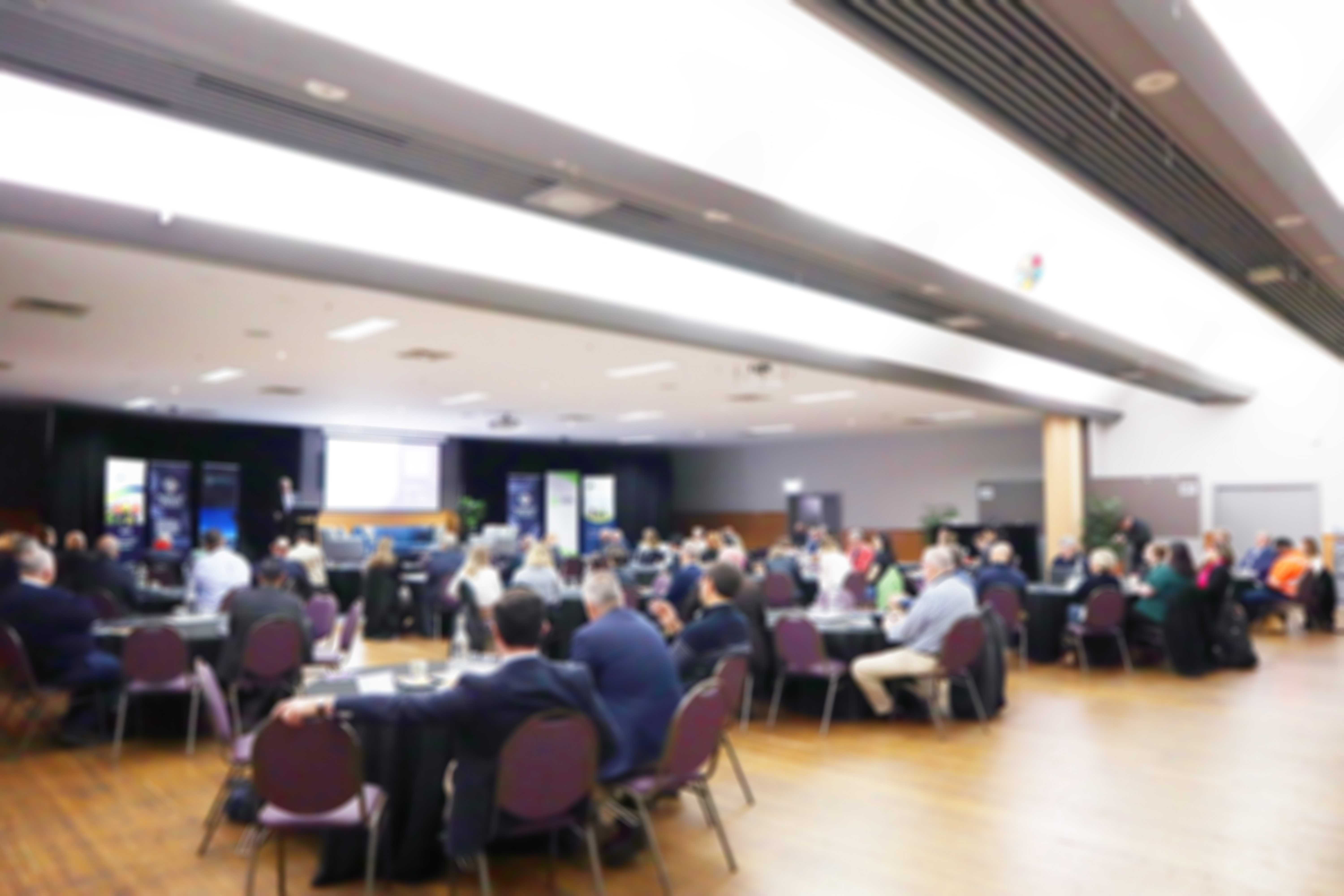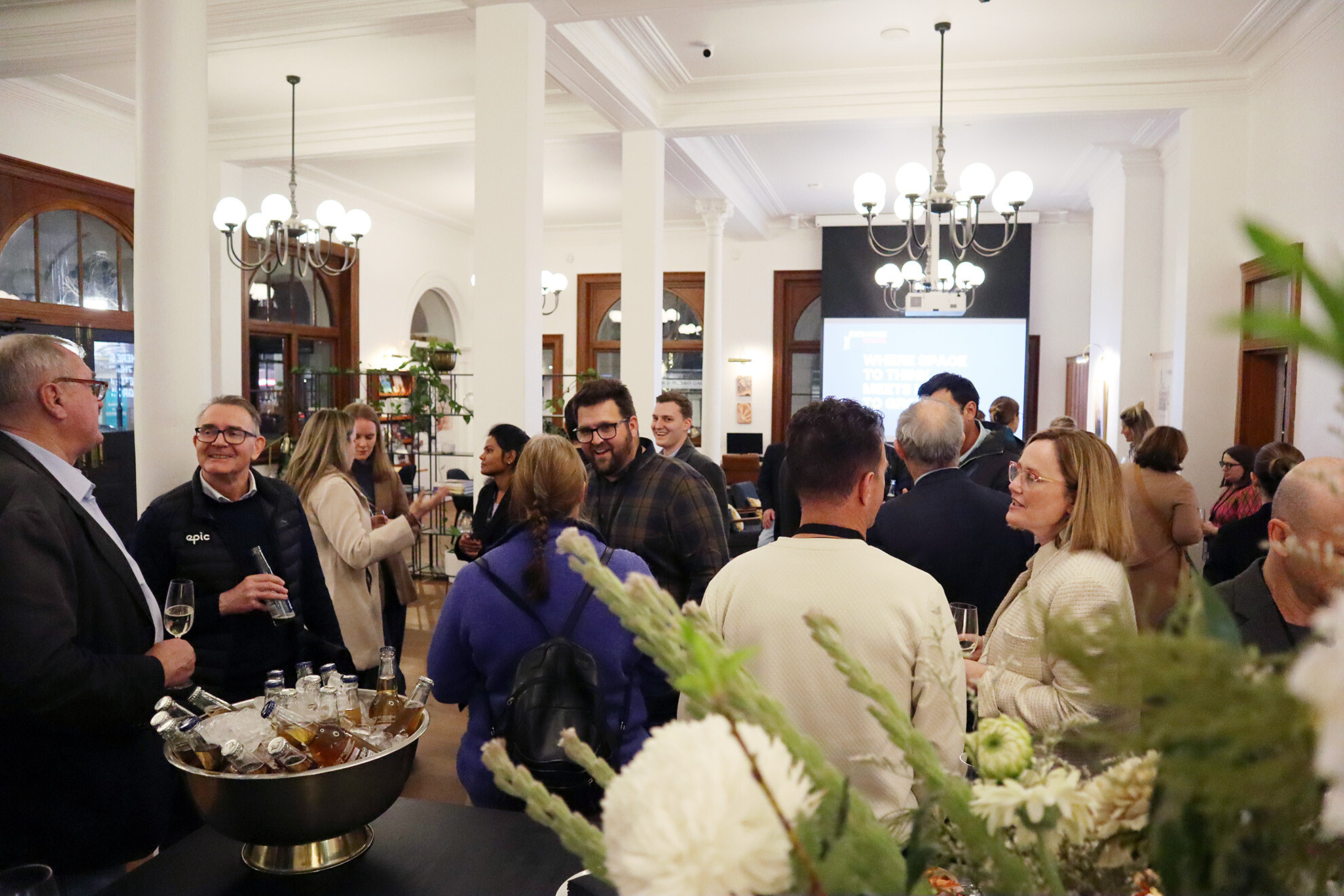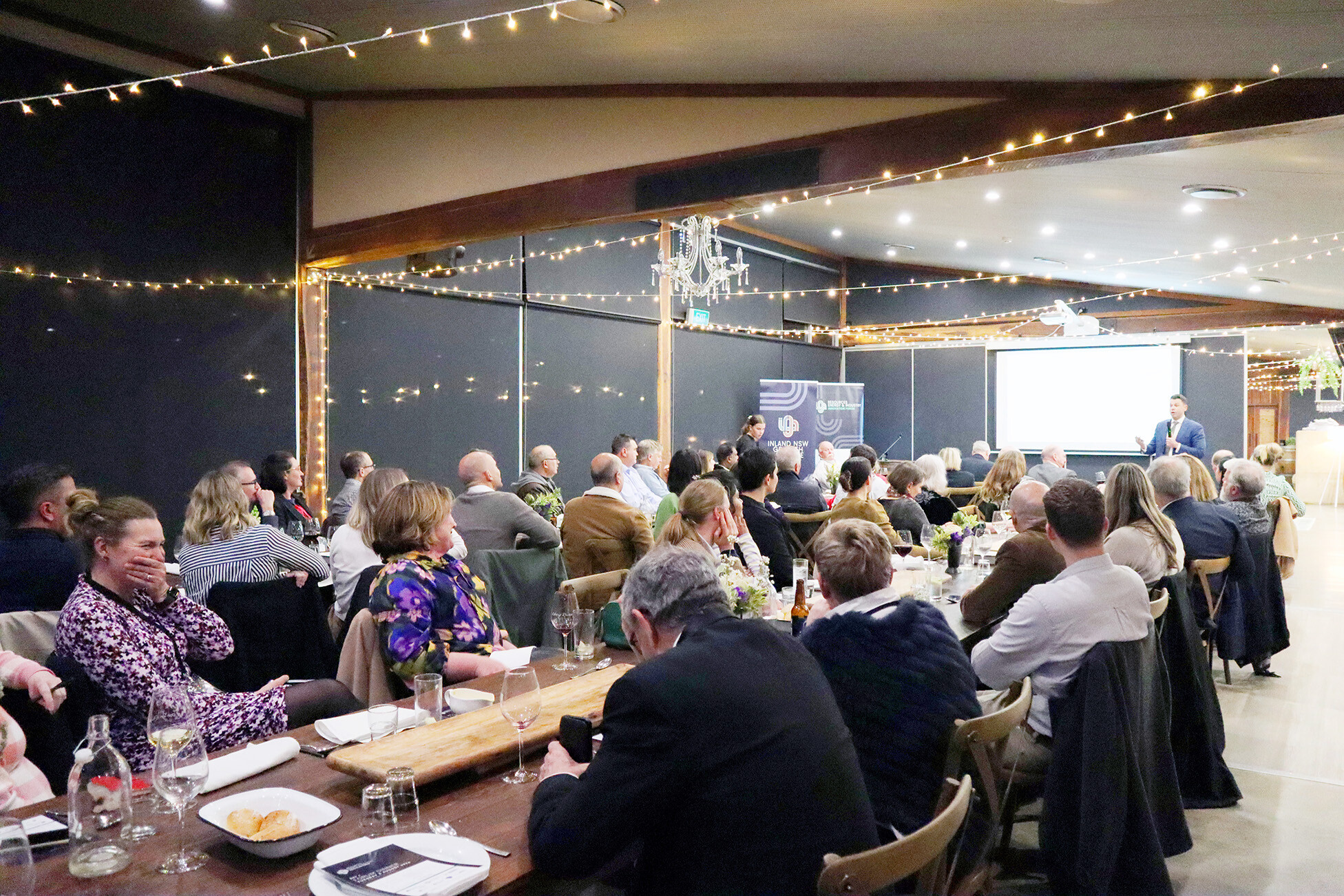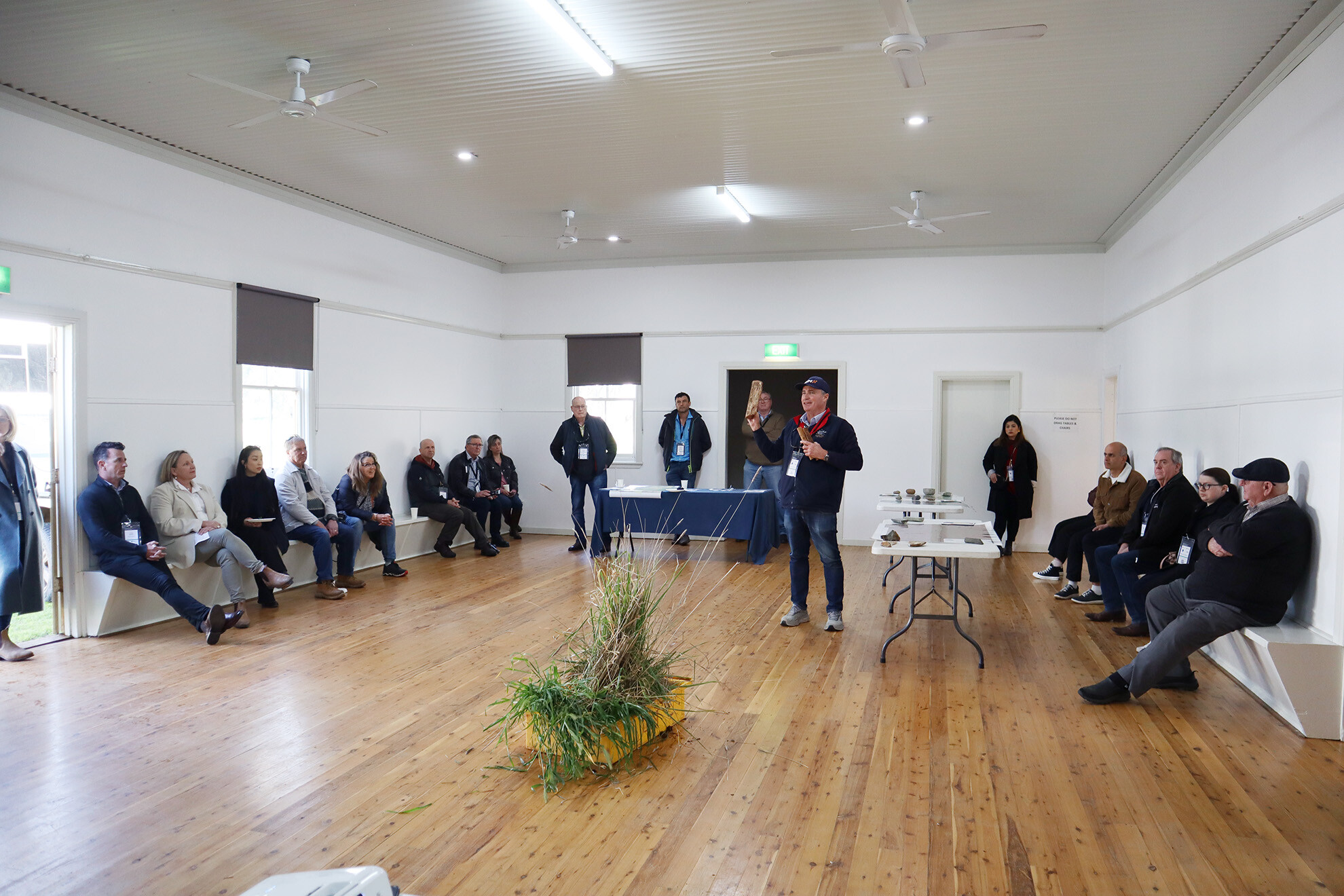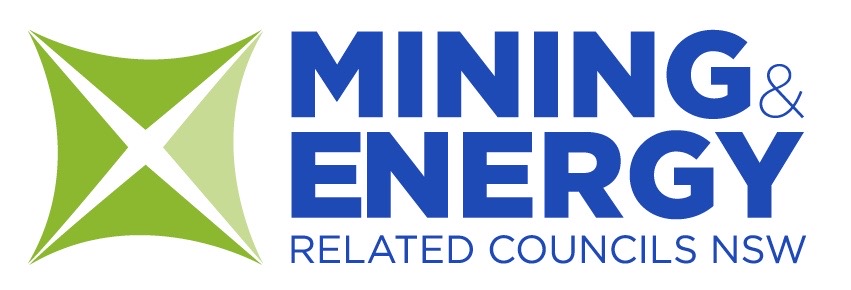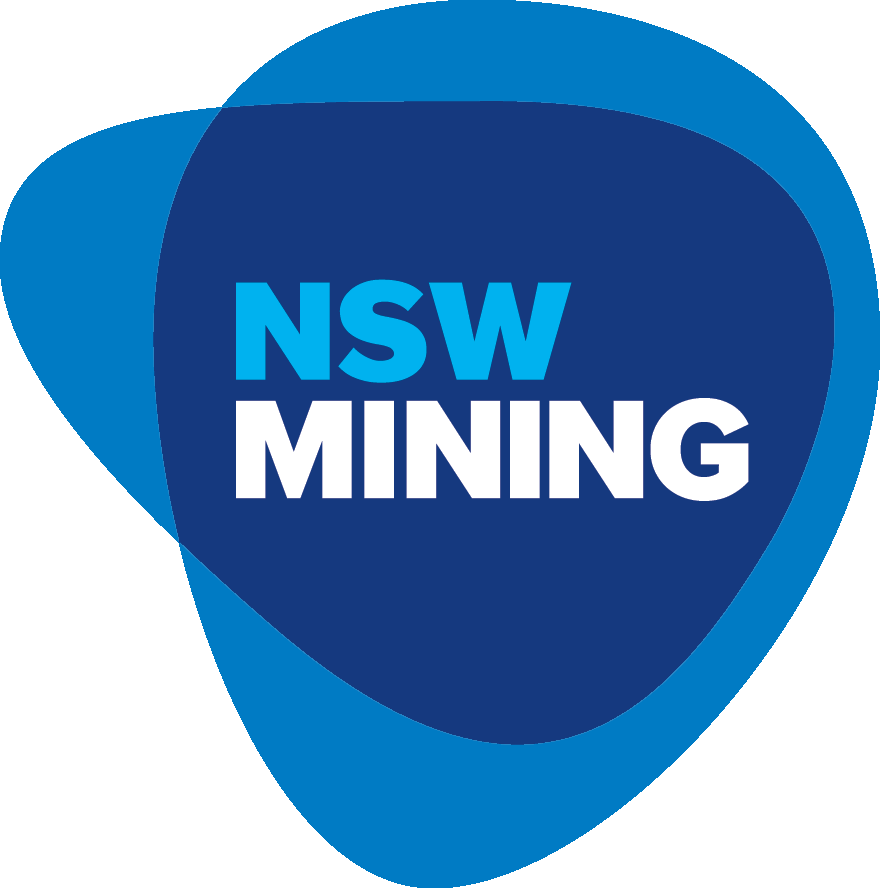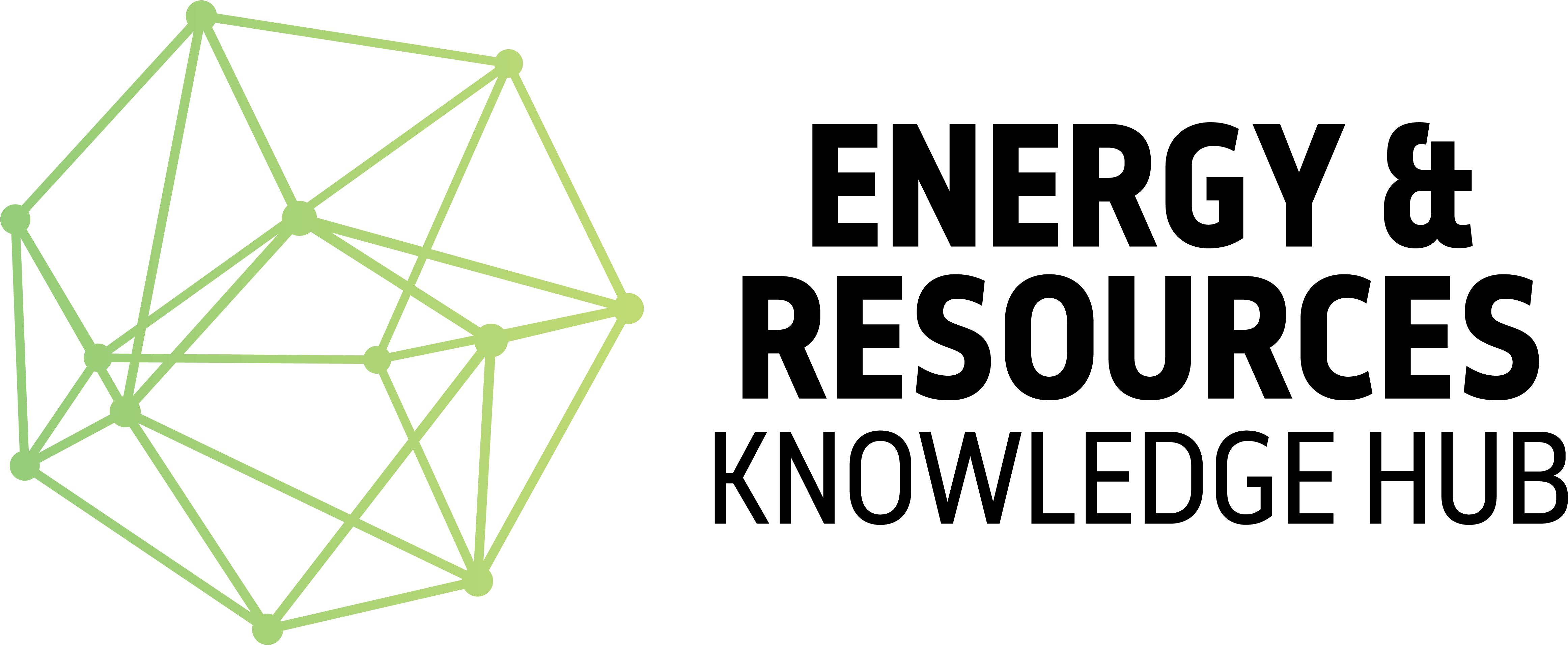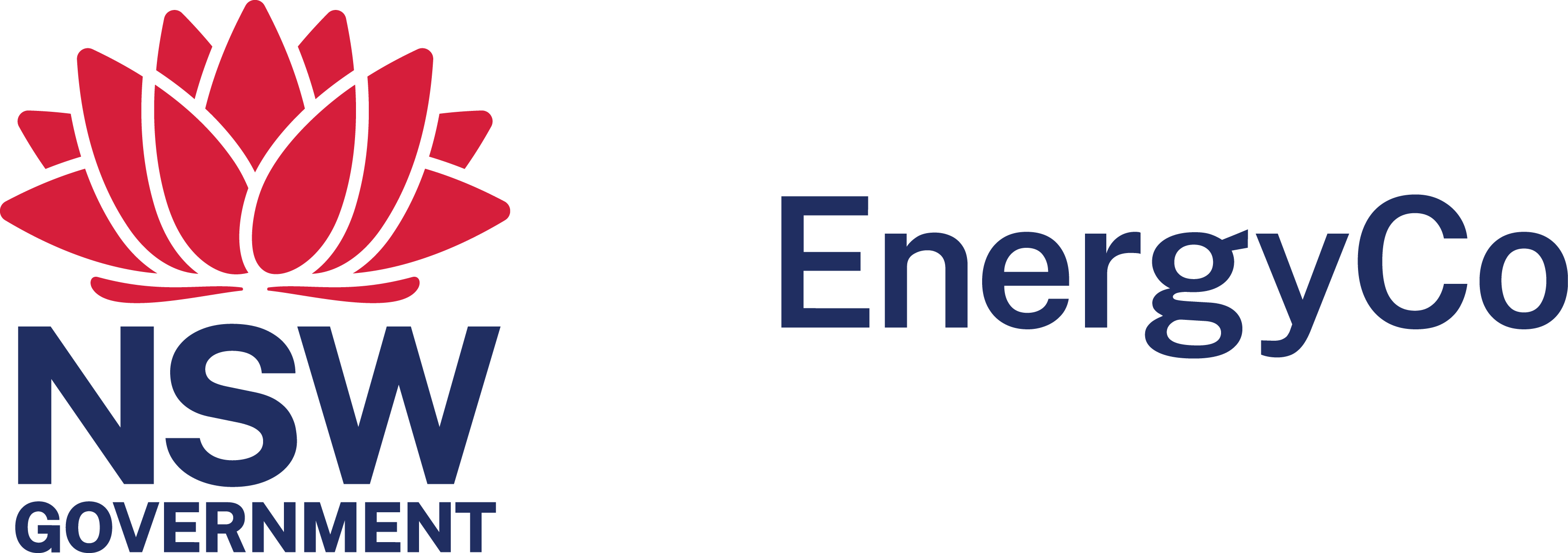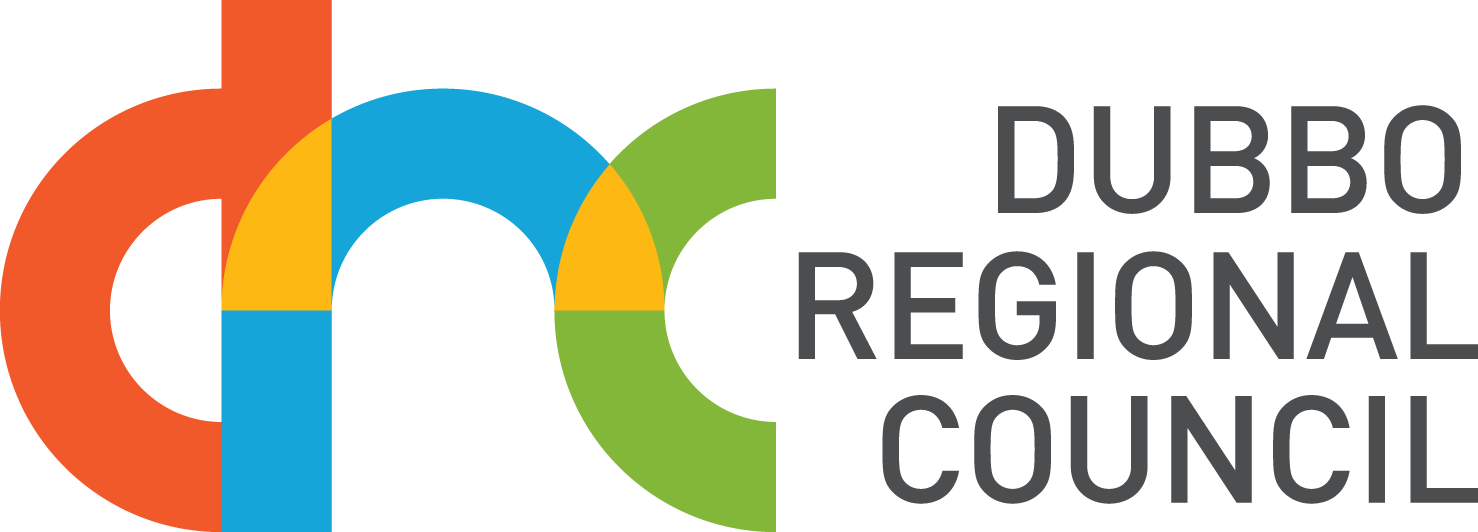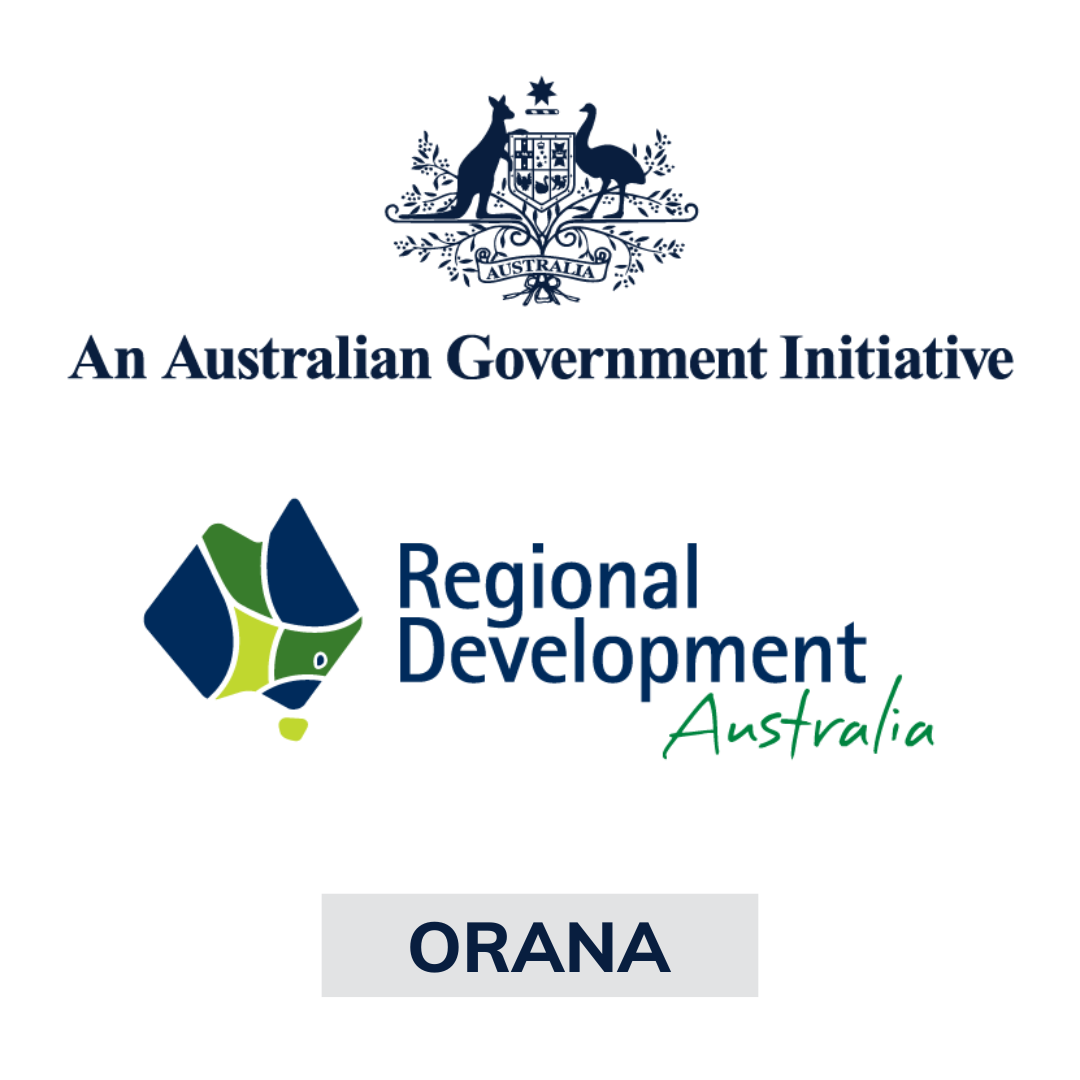RECAP
2024 REIIF - RECAP
The third annual Resources Energy and Industry Innovation Forum (REIIF) brought together key industry leaders, regional stakeholders, and investors to discuss the future of resources, mining technologies, renewable energy innovation, world-class industry practice, and future skills and opportunities for the Orana and Central West regions of NSW.
More than 40 speakers presented to an audience of 250 people over the three-day event.
The Forum was developed in partnership with Regional Development Australia (RDA) Orana and the Association of Mining and Energy Related Councils (MERC) NSW, along with the support of five corporate sponsors.
DAY 1 - RECAP
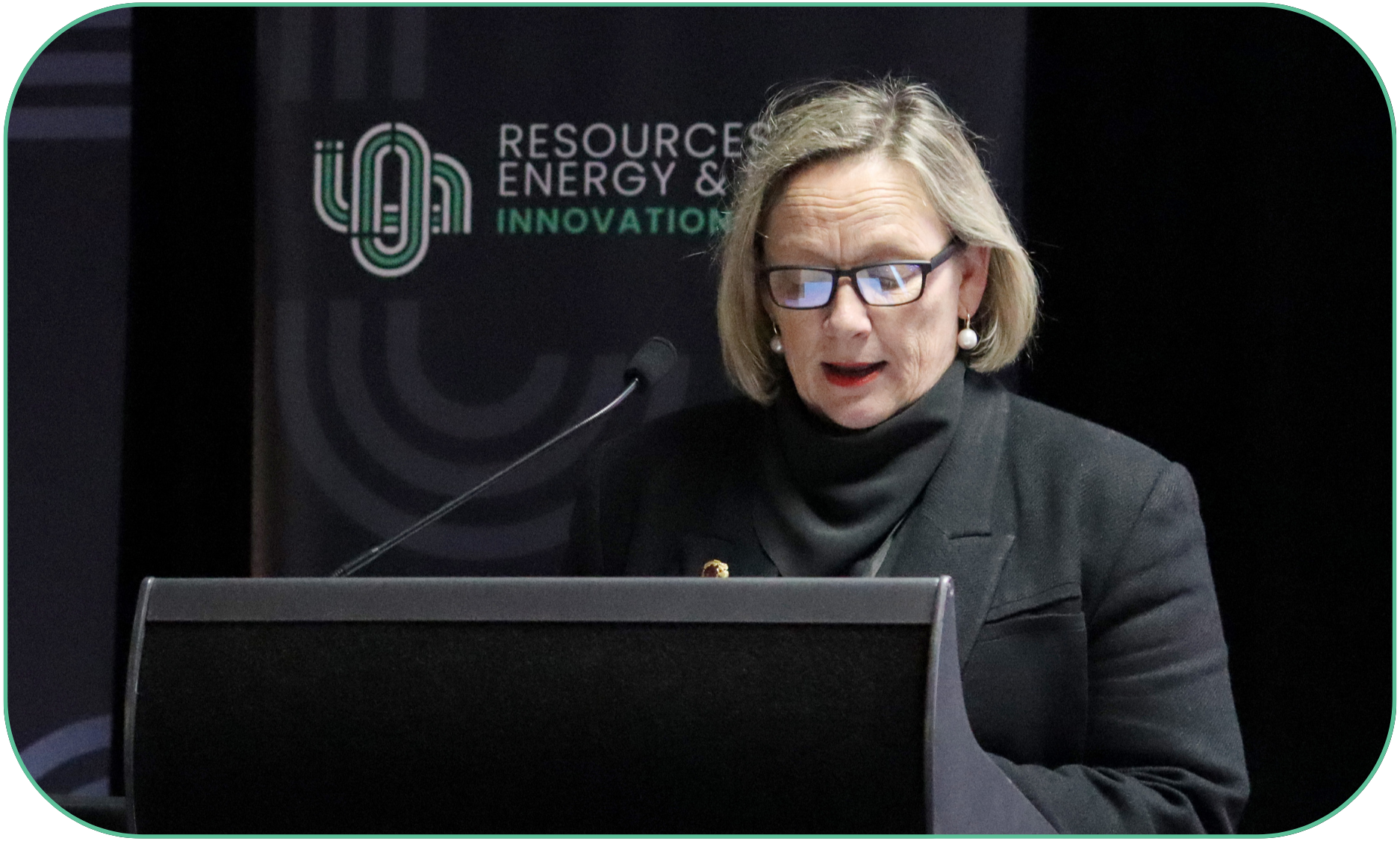
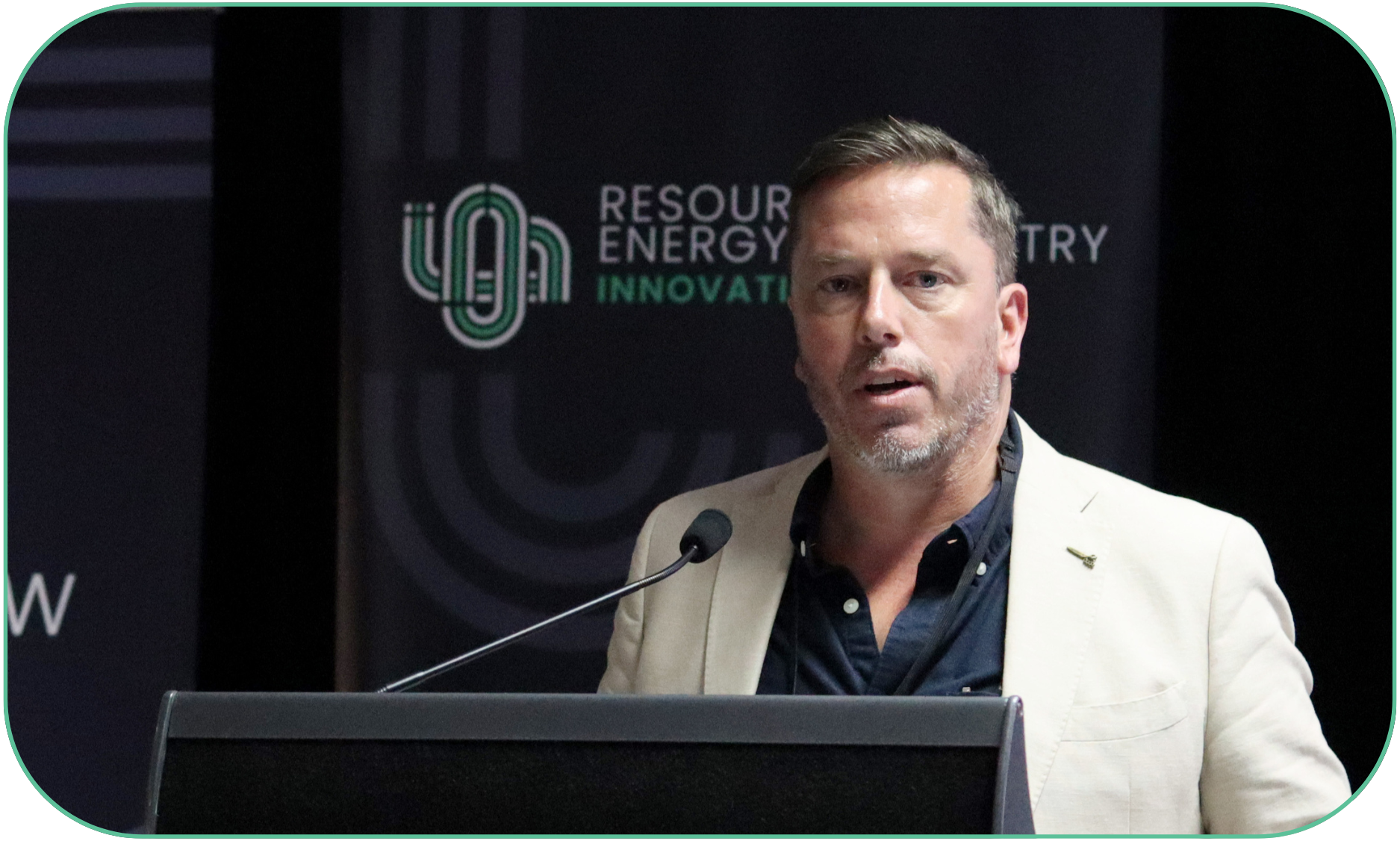
Day one began with an introduction from host RDA Orana and Inland NSW Growth Alliance (INGA) CEO Justine Campbell where she provided an overview of the INGA initiative and how it is supporting the Mining and Energy Sectors across regional NSW and the innovative projects that were being undertaken under the organisation.
Official Opening
Attendees were then welcomed by major sponsor Mining Energy Councils of NSW Executive Officer, Dr Michael Askew who outlined the value of the association, how it was the peak organisation representing resource and power generation communities in NSW and the benefits of collaboration. He spoke about the benefits of joining the organisation and their focus on delivering government policy that strengthens the interest of members and funding, while enabling economically resilient, socially inclusive and environmentally sustainable member councils.
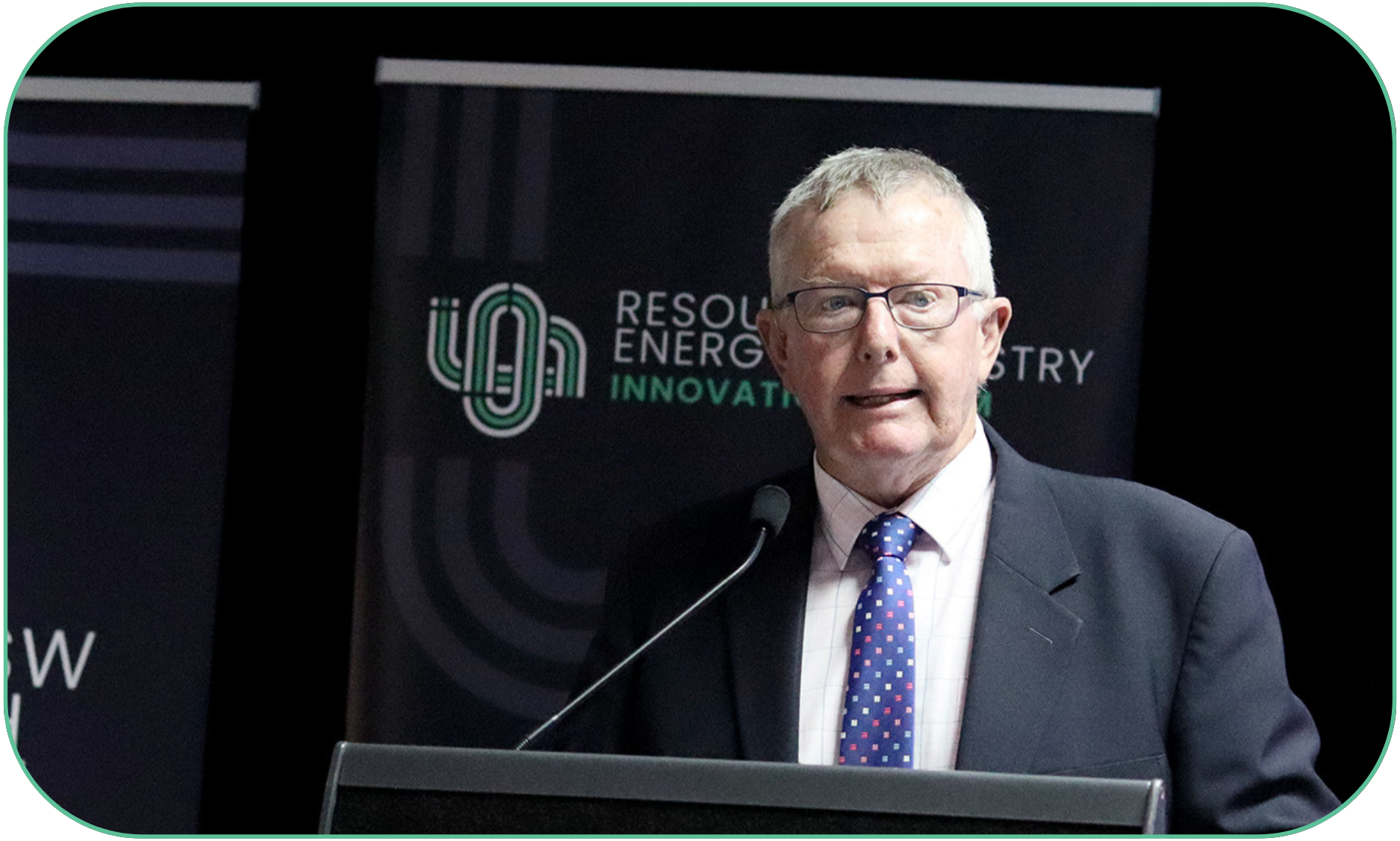
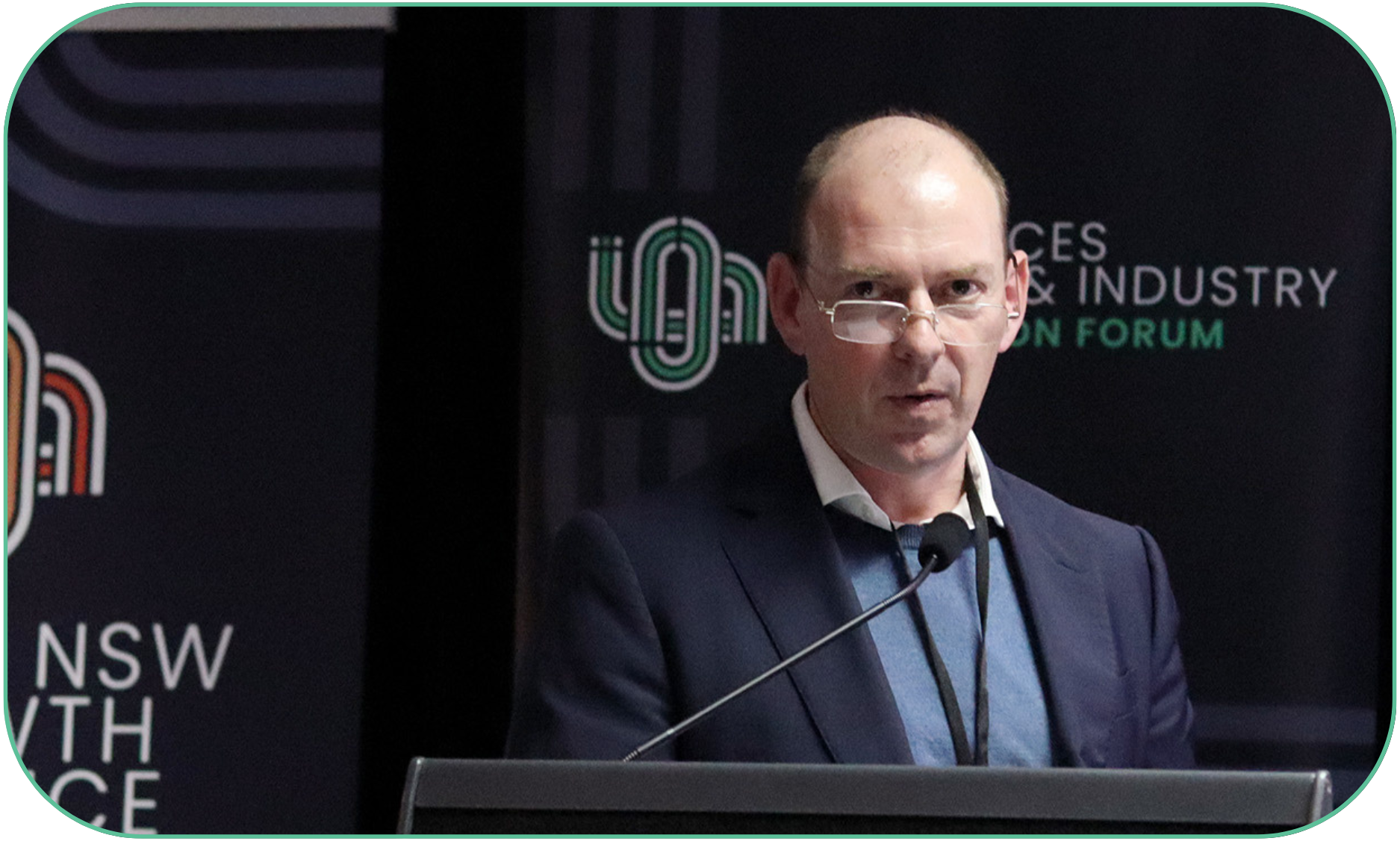
We were privileged to hear from Federal Member for Parkes, the Hon Mark Coulton MP, in what was possibly his final address to an Orana RDA event after announcing his retirement from politics. Mark provided a passionate ministerial address, highlighting the need for a collaborative approach towards renewable energy. He spoke about the Orana and Far West regions being a mining and agricultural powerhouse stating that the regions were one of the most productive in the country. “The critical minerals that are so important for a modern future being mined at Toongi for renewable energy generation.”
Mark spoke about the importance of a mix between renewable energy and other projects including the Inland Rail Project stating as an example that Inland Rail would see 150 trucks taken off the road with one train, which would result in significant savings in fuel and not to mention safety on the roads.
He also highlighted changing farming practices which now saw 1kg or grain or fibre produced with less fossil fuel and less water than ever before. “Dubbo has the greatest individual uptake of solar of any city in the country. Individuals in the regions are taking their emissions reductions very seriously. We need to have a practical approach that is actually going to reduce our emissions and not reduce our ability to be productive and increase our productivity.”
CRU Base Metals Supply Principal Analyst, Piers Montgomery shared his insights on renewable energy and a call for critical minerals, from a global perspective. He outlined the global energy transition and how NSW and the Central West were well positioned from how we generate, transport, store and use energy. He said strategic competition was intensifying for critical minerals and it would be important for government to help the industry if it was going to compete with international markets. Piers also suggested that using locally produced material rather than imported minerals would help sustain the industry. He also stressed the importance of investment now if Australia wanted to meet its 2050 net zero goals.
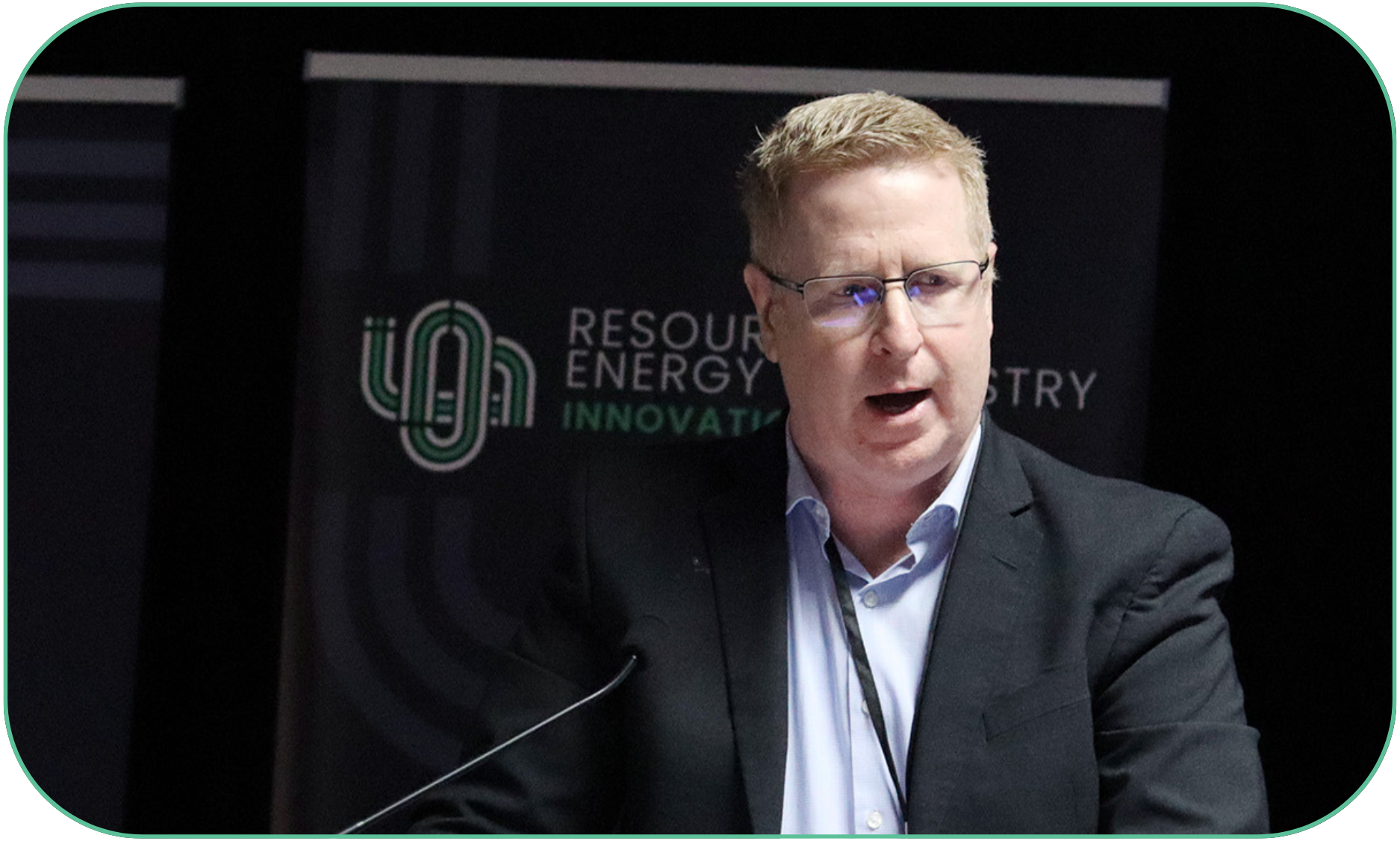
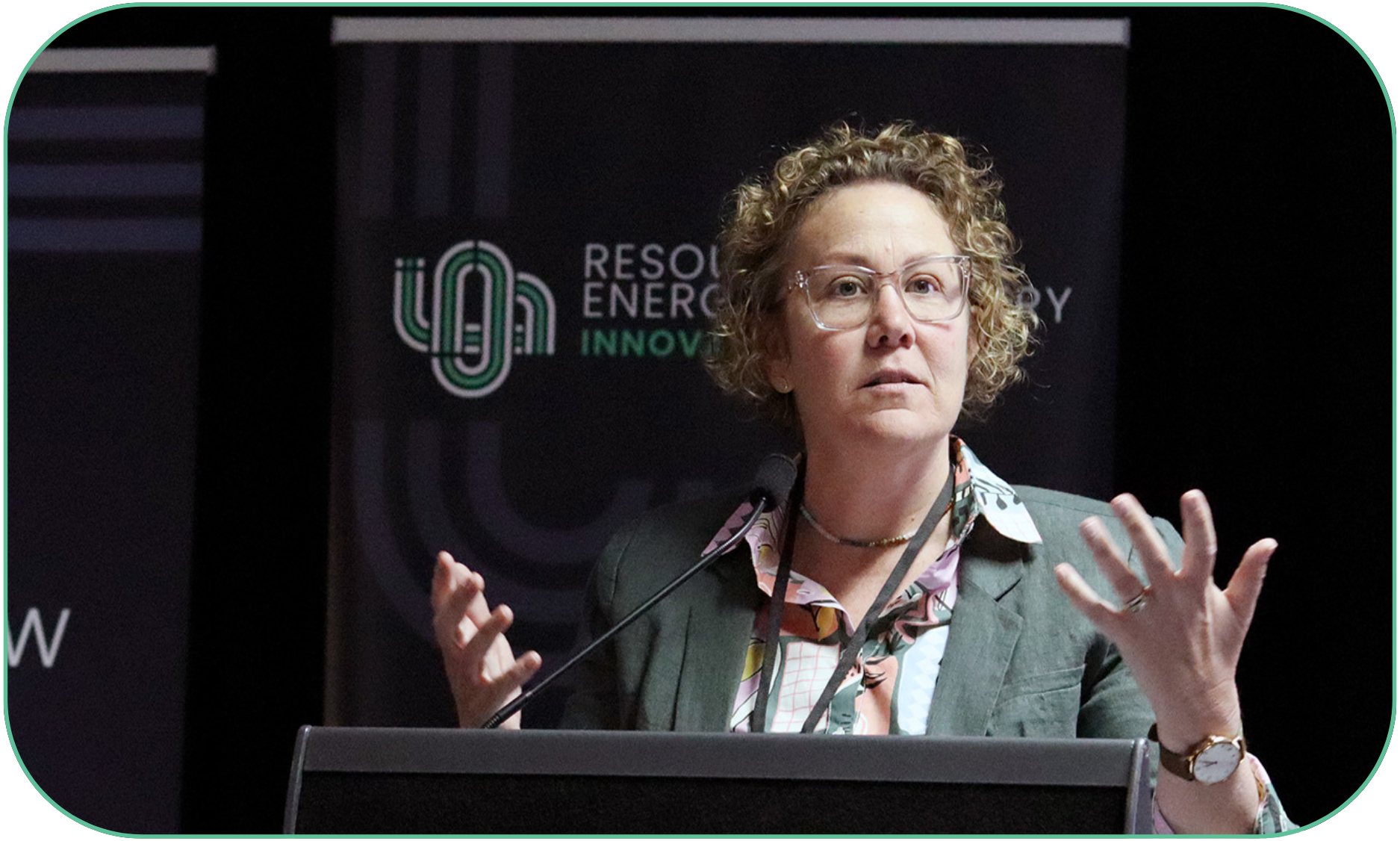
In the heart of our region is the development of the Central-West Orana Renewable Energy Zone (CWO REZ). Energy Co Planning and Communities Executive Director, Ash Albury provided an update about the CWO REZ project and recent announcements about funding opportunities for business and community groups. Ash outlined the roadmap, which coordinates investment in generation, storage and transmission and the Network Infrastructure Strategy. He spoke about a whole of government partnership for the coordination and delivery of the project with more than 2000, 85m+ turbine blades expected to be transported, housing needs for up to 10,000 workers over the next 10 years and the need for increased mobile and data networks to facilitate large scale and remote construction and operation. Ash explained the community and employment benefit program for the Central West Orana which will invest hundreds of millions into regional communities, share the benefits of the REZ with impacted communities, be informed by local community priorities and a promise to leave communities better off than they were before. He said the program would be delivered over two stages with the first stage totalling $70.5 million and stage 2 likely to be announced at the end of the 2024-25 financial year.
Keynote Speaker
Vibrant rural entrepreneur, Engage and Create Consulting Director, Julia Spicer spoke to the audience about the impact of innovation in regional communities, how the regions need to be included in the journey and the role they play. She spoke about the need for regions to have a sense of control in terms of setting their own density and being a part of the future. Julia highlighted the need for national sovereignty zones and national capability zones that run along side the work being undertaken in the renewable energy sector. She also discussed the mindshift from multinationals offering sponsorship of footy jerseys with their logos and painted toilets to an investment in long-term infrastructure and collaboration within communities. She raised the topic of federal funding through the Future Drought Fund and the initiatives taking place to assist with diversification as well as the need for more support in development in the R&D sector. Julia also spoke about the $2.5B from the Australian Economic Excelerator program which is looking at how universities can partner with industries and develop commercialisation of the research into everyday industry. She concluded the session by advocating for the regions “we want to be in a position where you have a conversation with us and by us - not to us, or for us.”
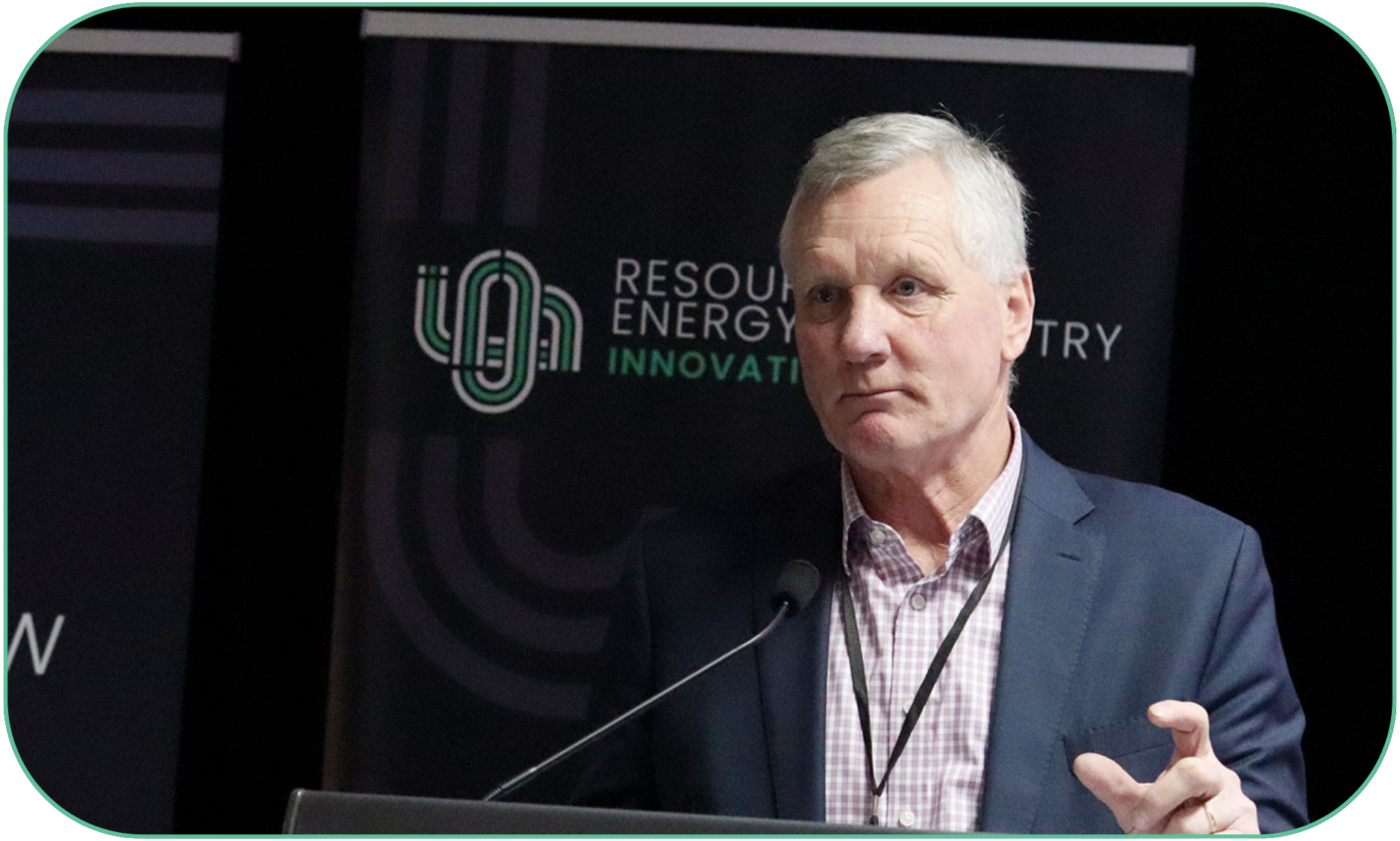
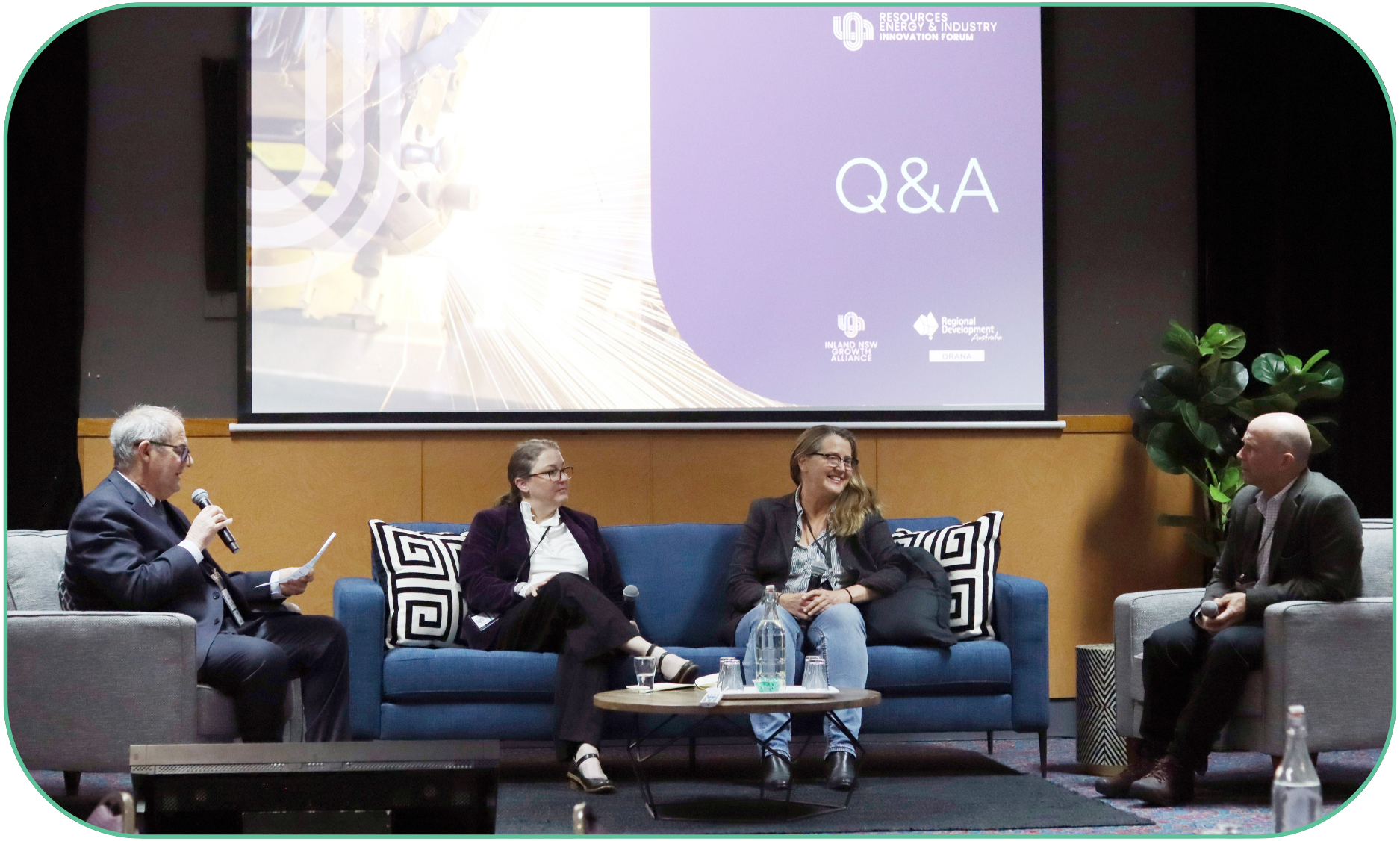
Keynote Speaker
Taking a local perspective into the Central-West Orana Renewable Energy Zone, Mid-Western Regional Council General Manager, Brad Cam provided an overview of the impacts the development was having in his local government area. The Mid-Western Regional Council is the largest LGA to be impacted by the CWO REZ with some xxx being developed. He outlined the impact on local communities which included accommodation and housing, water and sewer capacity, waste, roads and transport along with social services such as health, policing, education.
Brad explained that rental prices had nearly tripled in price and were being taken by workers rather than local families leaving the town in a housing and rental crisis. Roads were being degraded, and the impact from transient workers was putting pressure on all services. “We simply don’t have enough services to cope with the influx of people”.
Brad highlighted the need for better planning, more support from the NSW Government - especially for key worker housing, water and sewer infrastructure and for Mid-Western Council itself to deal with the number of enquiries, complaints, meetings and consultations.
Brad reiterated the need for better reporting and communication between project proponents, state and local authorities to ensure the regions were able to support the industry that was coming.
The Enablers for Impact session brought together some of the brightest minds from both the University of Newcastle and Beyond Zero Emissions to explore the key enablers and opportunities for the region. The session was facilitated by Newcastle Institute for Energy and Resources (NIER) Executive Director, Professor Alan Broadfoot who explained how researchers at NIER are working with industry partners to strengthen regional resilience through the delivery of sustainable solutions for global challenges. The audience heard about current work in addressing the social challenges and opportunities for regional communities, and how regions could build on their existing strengths to take advantage of emerging opportunities and projects.
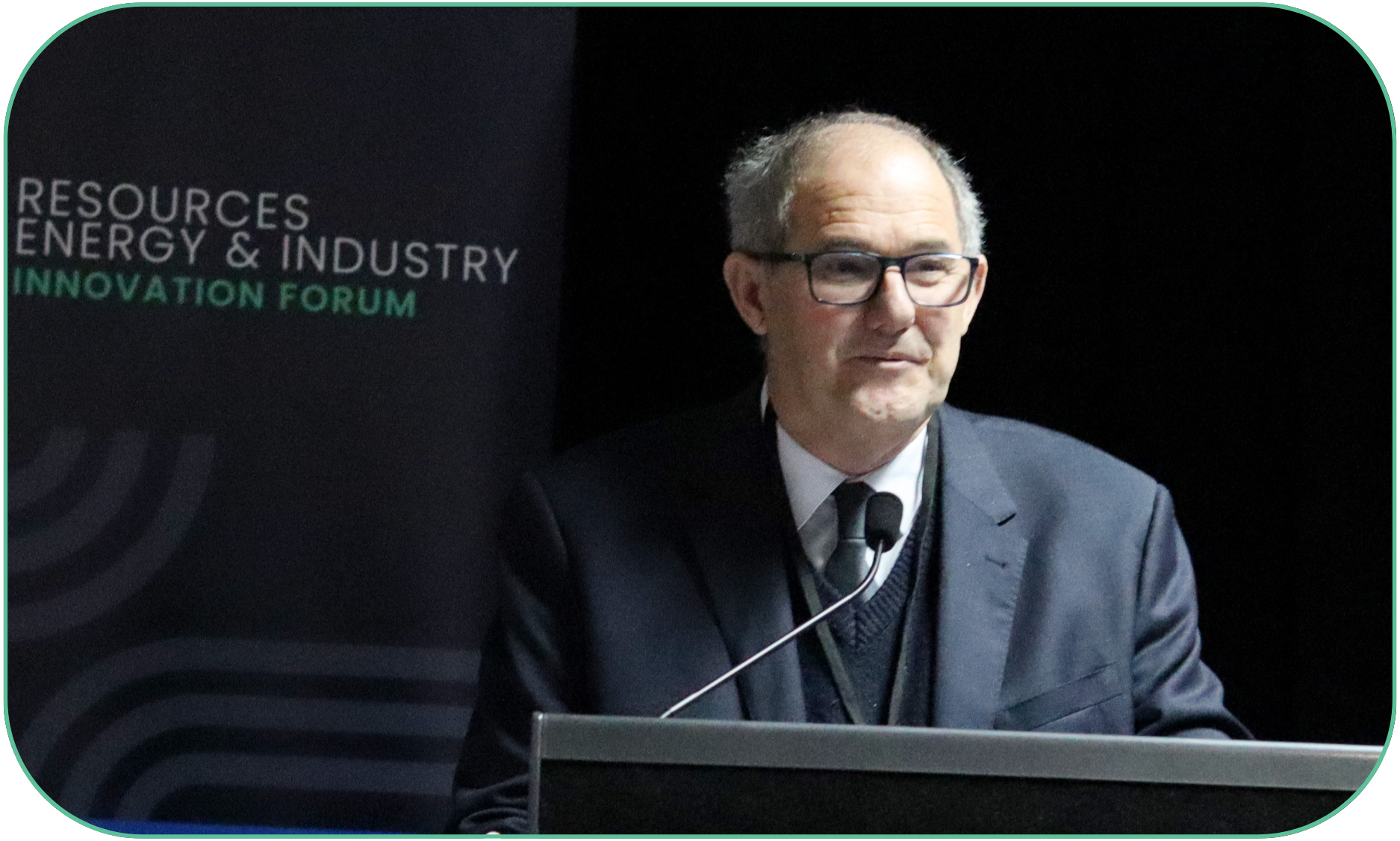
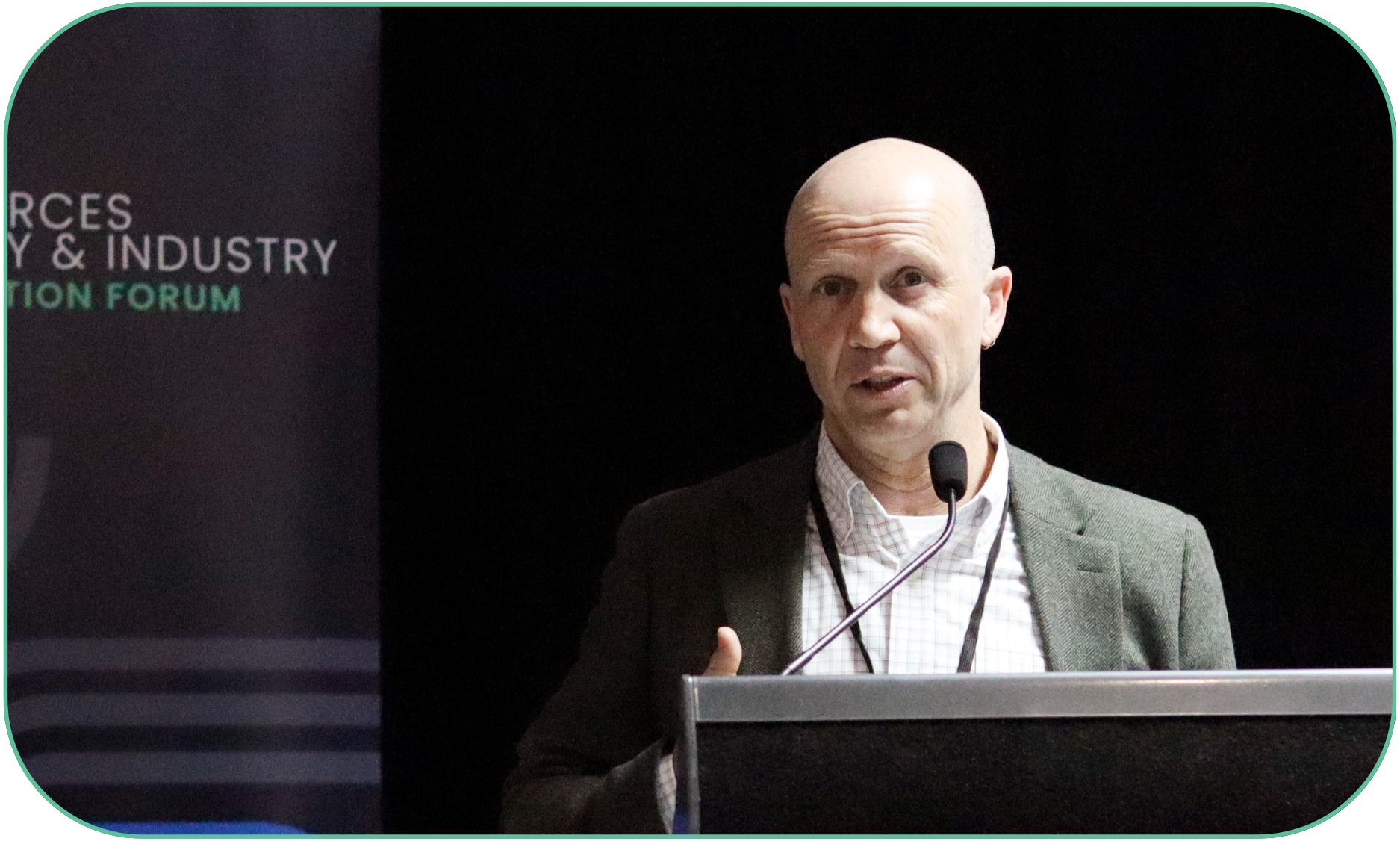
Alan touched on sustainable solutions in a circular economy and how NIER was working with other hubs within the energy and resources domain. He also spoke about sustainable fuels and chemicals and the Centre of Excellence for minerals. He spoke about a number of other initiatives including sustainable food and water systems, water security and climate adaptation and hydro harvester and the centre for innovative energy technologies.
We welcomed University of Newcastle Institute for Regional Futures Consultant, Dr Jai Cooper to the stage where he spoke about empowering communities and generating social impact across regions. Jai explained the success of the Hunter Insight Series which revealed key perspectives of Hunter residents, with local views compared to those in other regional areas and metropolitan areas. He also discussed the Regions Matter program, which is an Australia-wide research program examining why people choose to live and work in regional Australia. The research examines people’s perspectives about their futures and the future of their region, and how these are shaped by the activities of government, industries and communities
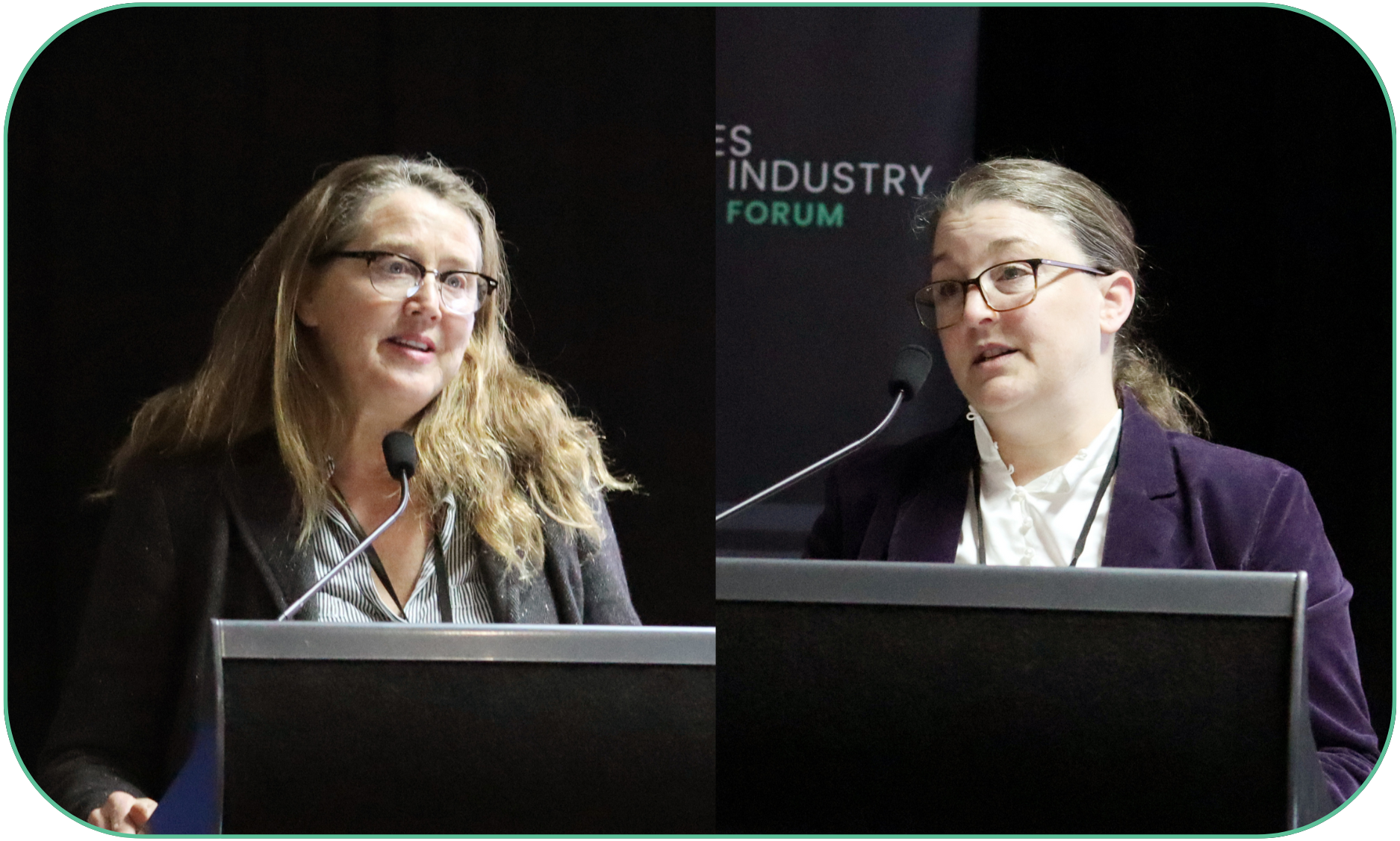
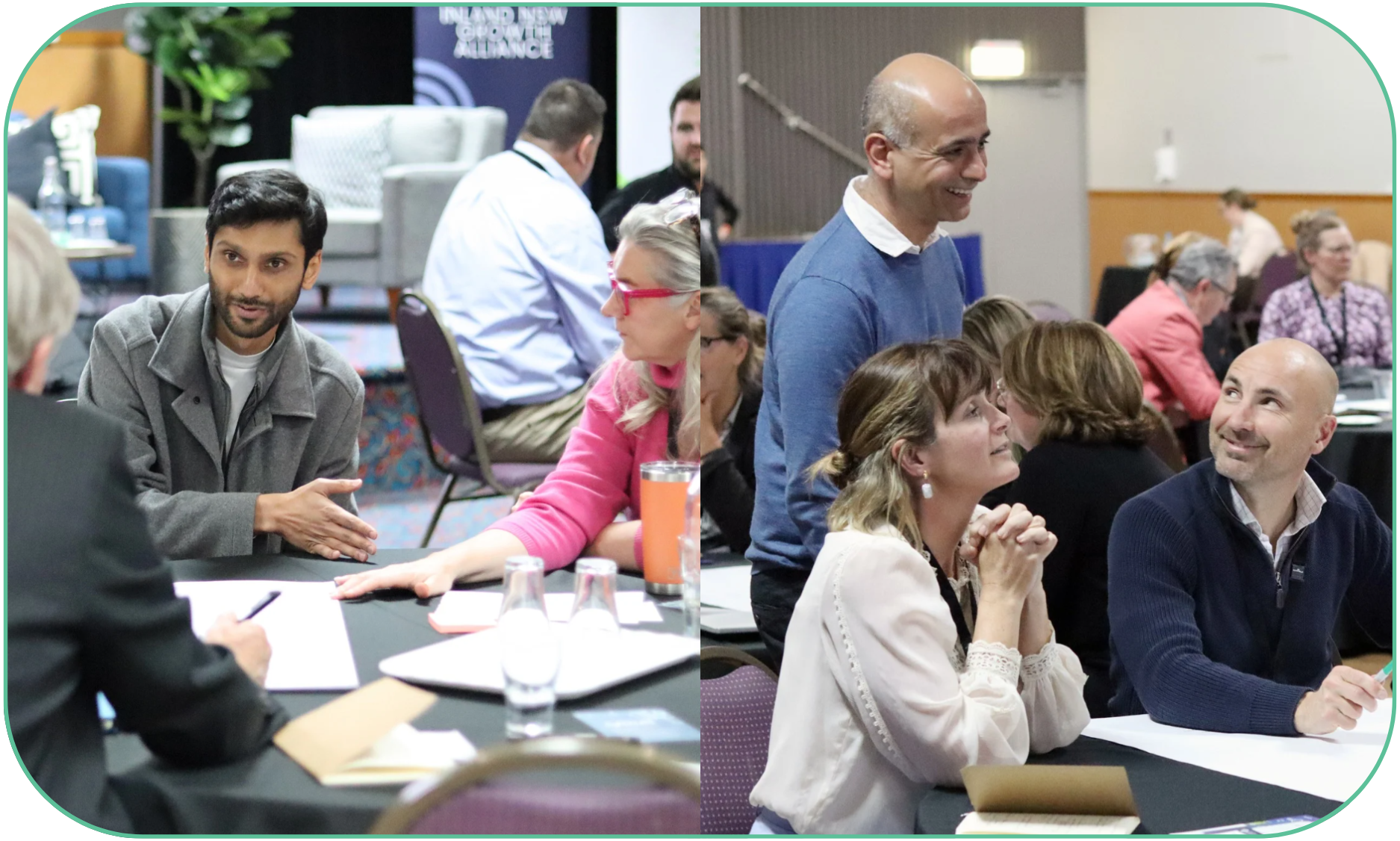
Beyond Zero Head of Engagement, Beth Mitchell and Senior Project Manager, Sam Mella shared their insights on building strength and the key enablers for impactful change. Beth explained research findings that showed growing just five onshore cleantech supply chains - solar, wind, batteries, heat pumps and commercial EVs - could generate $215 billion in domestic revenue and create up to 53,000 new jobs by 2035. Sam explained how the Central-West Orana region as a renewable energy zone and mining and agricultural centre could make the most of Australia’s clean technology opportunities.
An interactive workshop about the opportunities to shift from linear economy to circular economy principles concluded the day 1 of the forum. The workshop was presented by Trailblazer for Recycling and Clean Energy Academic Lead, Sandeep Kirpalani and SMart Centre Microfactories Head, Anirban Ghose. The workshop considered the genuine complexities of stakeholder interests, economics, policy considerations, community impact and technology and the need for innovative models within these considerations.
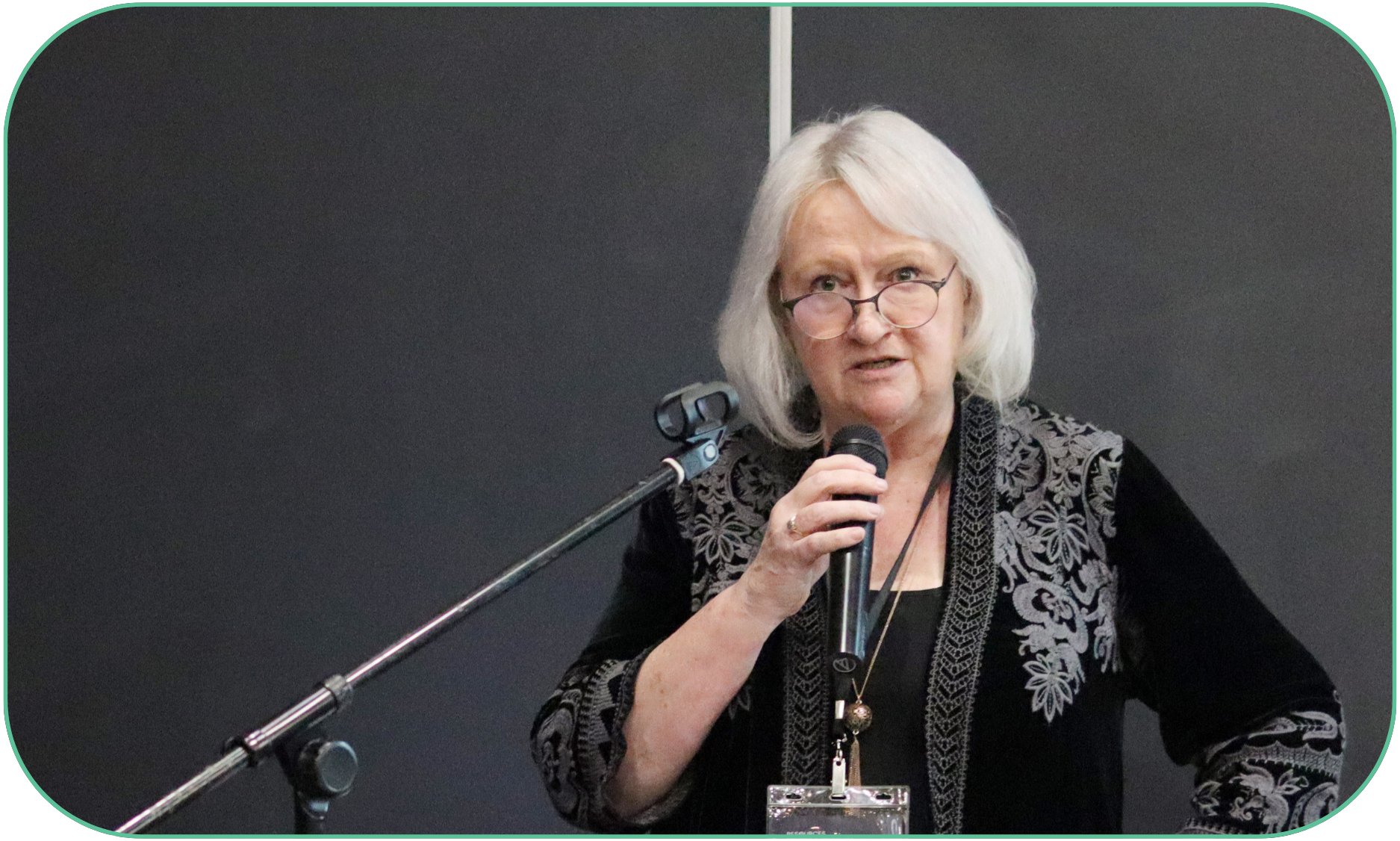
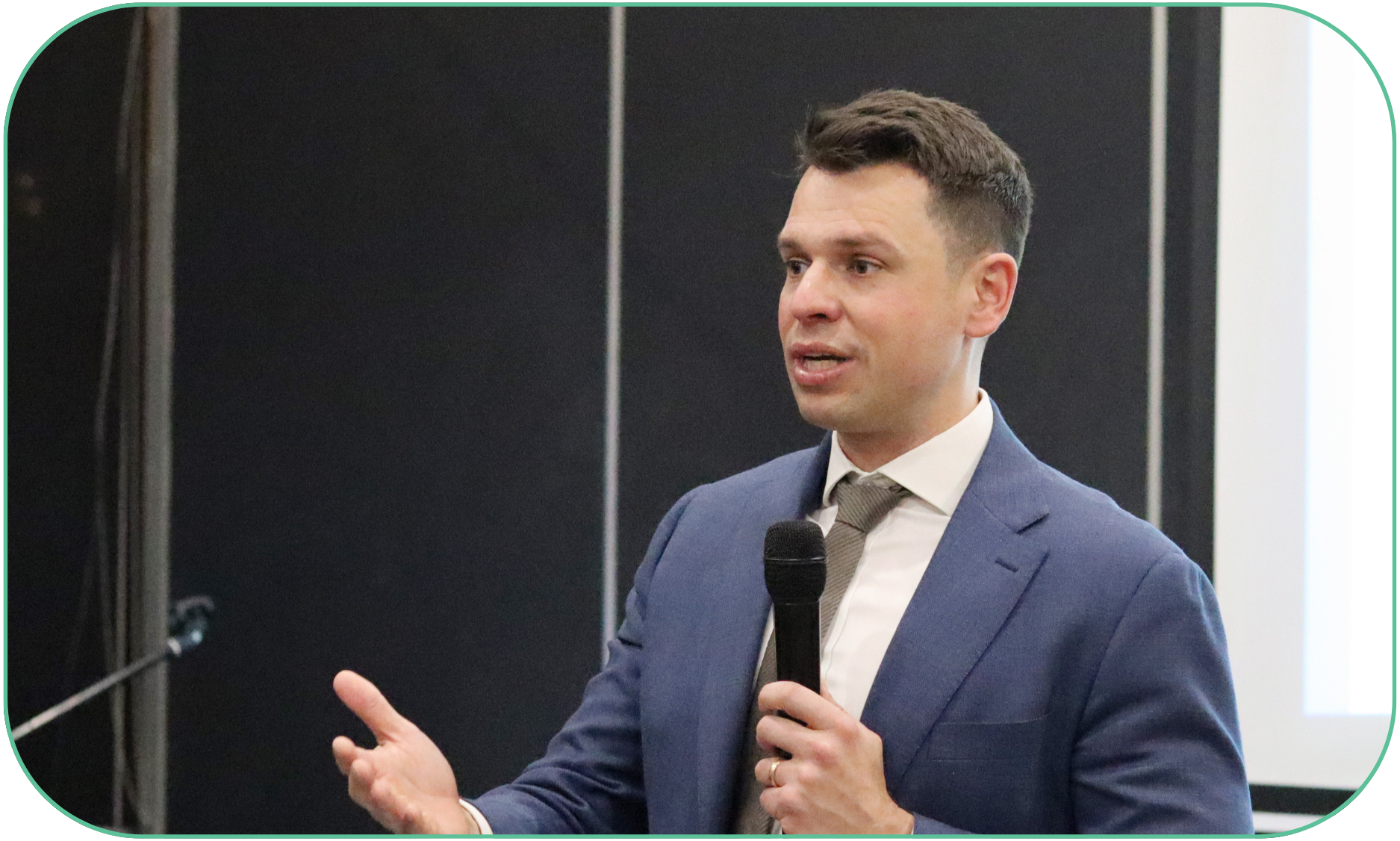
Evening Session
Thiss year’s Forum dinner was held at Lazy River Estate where guests enjoyed an evening session of information and entertainment.
Guests were officially welcomed by University of Newcastle Deputy Vice-Chancellor, Research and Innovation, Professor Zee Upton.
Keynote speaker for the dinner session was renowned global influencer The Demographics Group Co-founder and Director, Simon Kuestenmacher, who is ranked as one of the world’s Top 10 influencers in data visualisation. Simon entertained the audience as he discussed demographics and global trends that were shaping Australia today and into the future.
Simon provided a demographic outlook for the region and spoke about what the future for Dubbo and the wider Orana region looks like and what demographic changes were coming our way. He also discussed the current trend of decentralisation and thinking outside the square when it comes to the future of workforce and housing for the regions.
DAY 2 - RECAP
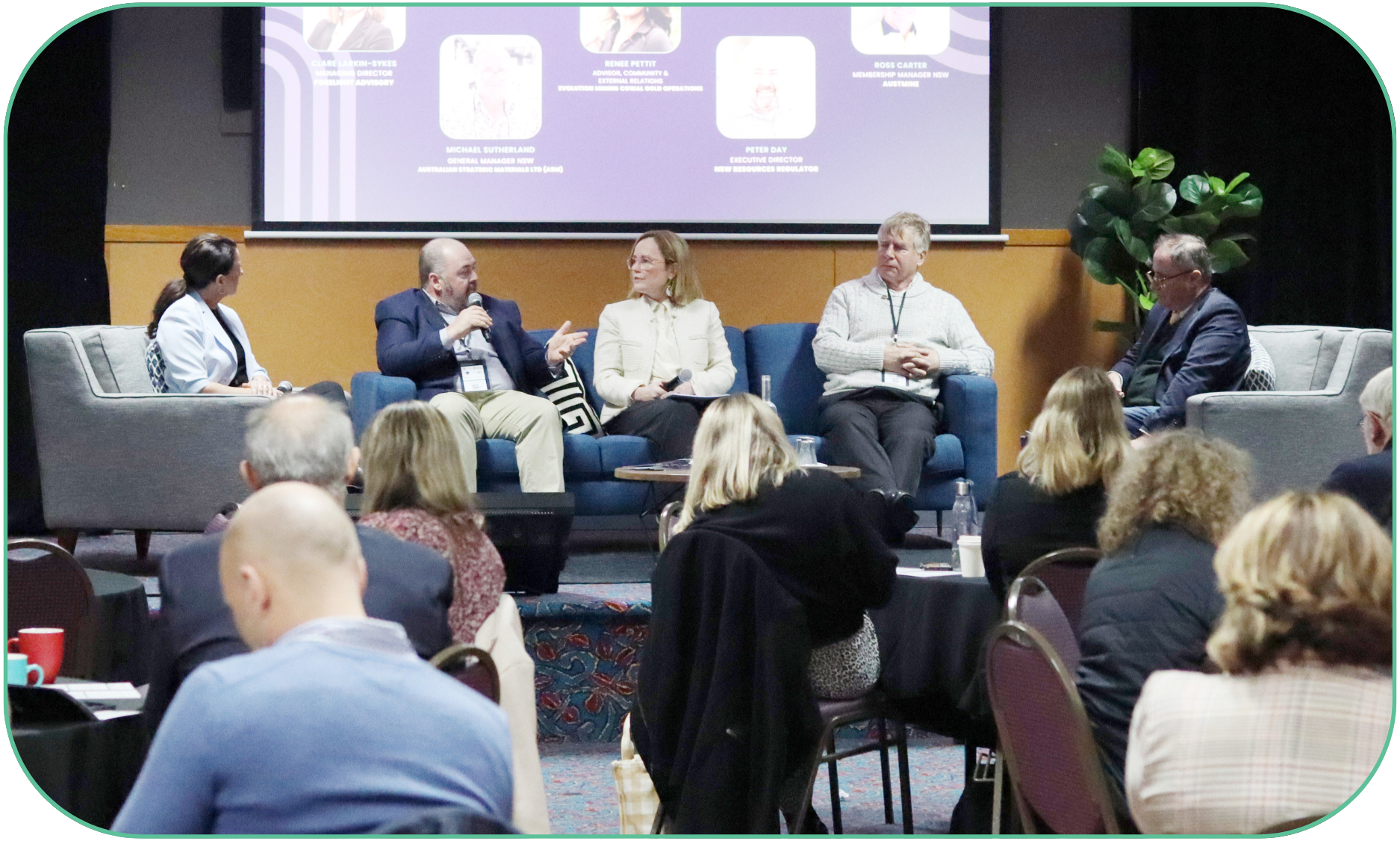
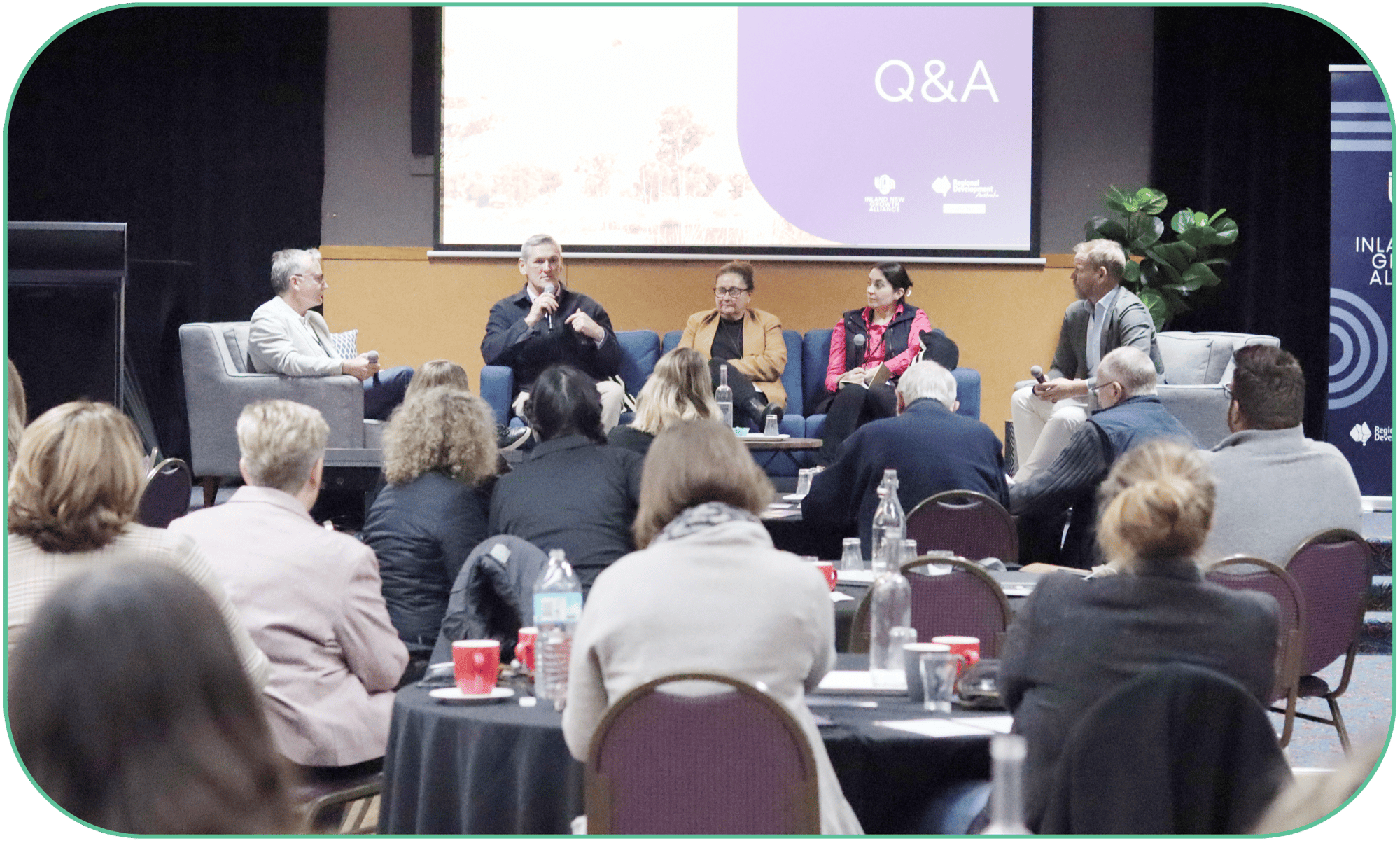
Resources
The resources industry underpins the development of new sustainable energy technologies - this session delved into how the industry was reducing its energy footprint while at the same time providing the necessary alloys to build a better, cleaner future and building relationships with the communities they work and live in. Attendees heard about the future of mining, exploration and geoscience with new opportunities arising from the growing demand for critical minerals along with a state of the region update for the mining, energy, technology and services sector.
Forelight Advisory Managing Director, Clare Larkin-Sykes, facilitated the resources session, which began with a presentation from Australian Strategic Materials General Manager NSW, Mike Sutherland who discussed the growth of Australian Strategic Materials and how it is positioning the Dubbo Project as a critical minerals producer with leading ESG credentials.
Evolution Mining Cowal Gold Operations Community and External Relations Advisor, Renee Pettit then explained the company’s commitment to positive community relations and sustainable development and discussed the importance of fostering trust and mutual respect between the business and their stakeholders, while highlighting the significant and successful partnership's they have forged.
Mining Exploration and Geoscience NSW Resources Regulator Executive Director, Peter Day provided an overview of the role of the NSW Resources Regulator, mineral exploration in NSW and regulatory requirements as well as providing observations about the industry as a regulator.
The session concluded with a presentation from Austmine Membership Manager, Ross Carter who provided a state of the region update for the Mining, Energy, Technology and Services sector highlighting innovation in the mining supply chain and how the sector was collaborating at a local, state, national and international level to grow the sector.
Energy
Energy is the pulse of our day-to-day life and how we create and use it is changing rapidly. What the future will look like is not certain, but what is clear is that we’re well on our way to a new energy future. Imagine the possibilities . . . a world where energy is sustainable and abundant. Session speakers highlighted this goal, speaking about the decarbonisation of global economies and the emergence of carbon offsets through land use trade offs in agriculture, attendees heard about community benefits from the Central West Orana Renewable Energy Zone, how reducing carbon emissions can be achieved while creating jobs, economic growth and how one local government was building legacies for the community from the energy transition.
Facilitators for the Energy session were NSW Decarbonisation Innovation Hub Business Development Manager Mark Lewis and Research Partnership Development Manager LPI Network Dr Liz Smith. Mark provided an overview of the Decarb Hub which is broken down into three separate hubs: Powerfuels including Hydrogen Network, Land and Primary Industries network and Electrification and Energy Systems Network. Mark spoke about the Electrification and Energy Systems Network Hub highlighting the economic benefits of electrification. He also discussed a community engagement/social licence stewardship pilot proposal and the Seed Grant Scheme.
Squadron Energy Chairman, Jason Willoughby provided an overview of Squadron Energy’s projects within the Central West Orana Renewable Energy Zone – including Uungula Wind Farm which is currently under construction. He spoke about benefit sharing and leaving a lasting legacy in the Central West and stressed that the energy transition needed to be fair for regional communities.
Land and Primary Industries (LPI) Network Research Partnership Development Manager Dr Liz Smith then addressed the audience about the LPI network explaining that it consolidated industry, government, community and research expertise in emissions reduction, fostering innovation and growth of commercialisation and technology growth. Liz detailed some of the on-ground projects that were currently underway and how they could be implemented in the Orana region.
Greencollar, Head of Science, Dr Cathleen Waters discussed the decarbonisation of global economies that were requiring a shift to renewable energy as well as the delivery of carbon offset, both of which may lead to land use trade-offs particularly agricultural land use. She outlined how carbon and nature markets were emerging as a new additional income stream for primary producers offering a mechanism to ensure integration and benefits flow to the farm business and the approaches to get the balance right, so that land use trade-offs are minimised, sector transition to net-zero is enabled, and ensuring abatement is real and enduring are discussed.
The final speaker for the Energy session was Dubbo Regional Council CEO, Murray Wood who outlined Council’s focus on building legacies for the community from the energy transition, electrification and being a part of the Central West Orana Renewable Energy Zone. Murray highlighted some of the challenges and opportunities being faced by the REZ including housing, water and wastewater initiatives and workforce development.
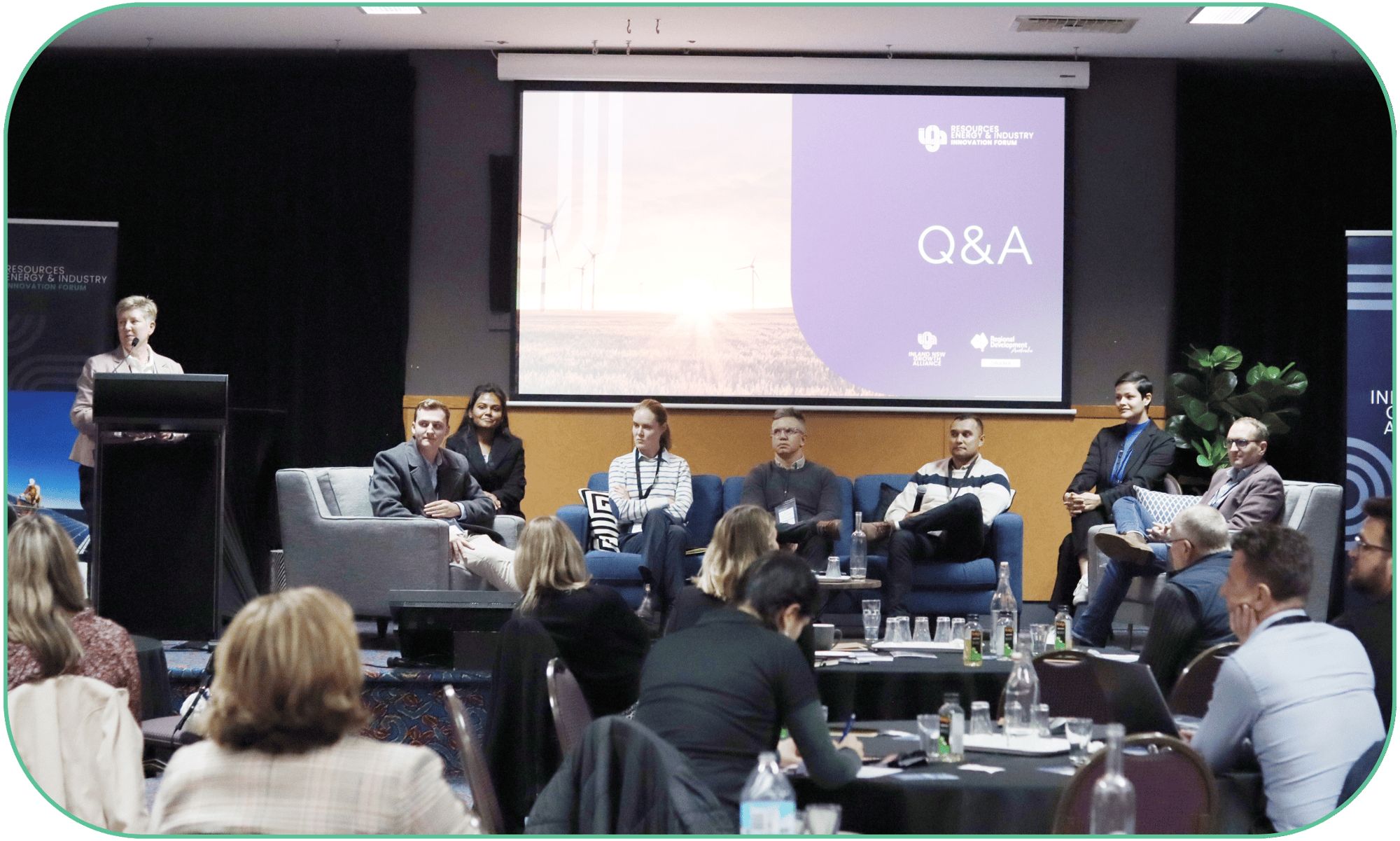
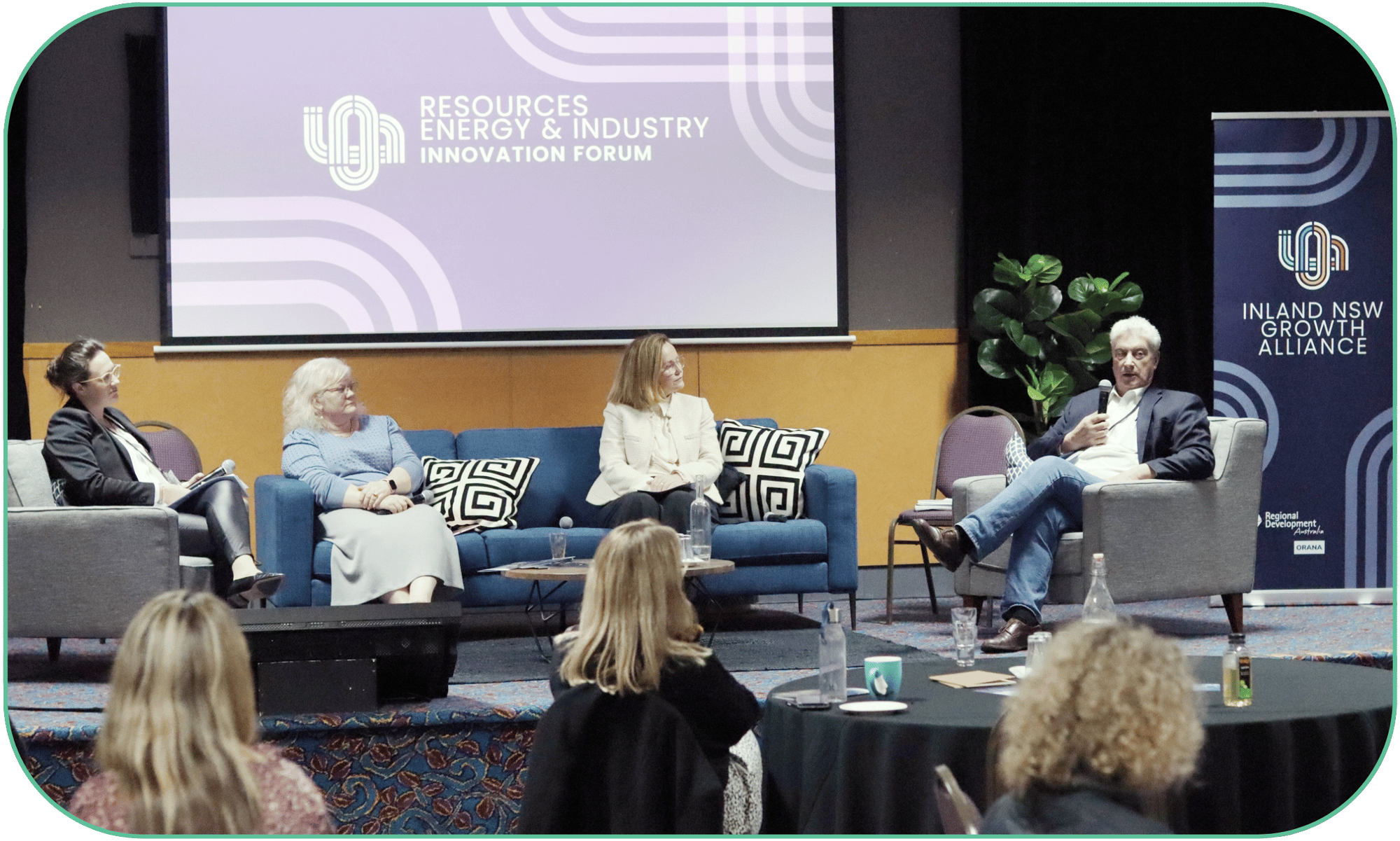
Industry
The industry session opened the door to new opportunities for industry and the community through partnerships, collaboration and new ideas. Speakers discussed innovations in the recycling and rejuvenation of PV panels through an indigenous corporation servicing the renewable energy circular economy market, how access to a qualified workforce was a universal constraint for all industries and a model that could be a game changer for the new energy industry, a better way to support communities in negotiating with government and industry to get the best possible local outcomes from the energy transition and attendees heard from from University of Newcastle Doctoral Training Centre PhD Candidates who pitched their innovative thesis ideas addressing the challenges and needs of the future energy and resources sector.
Facilitator for the industry session was Marathon Health CEO and CSU Pro Chancellor, Megan Callinan. Megan explained how Marathon Health, along with its partners, had developed a workforce development solution that was delivering training completion outcomes that are nearly double the national average and supporting long term employment outcomes for vulnerable jobseekers. She also highlighted how the model could have applicability for other engine industries and the key success factors and cross sector opportunities.
Yurruga Co-founders, Alex Frail and Joe Williams provided an insightful overview of the Yurruga project and how it plans to develop the first custom-built solar energy circular economy facility, owned and operated by an indigenous corporation in Australia. The team outlined how consolidating the circular ecosystem of PV panels (collection, testing, certification, resale or recycling and materials recovery) would create optimal operational efficiencies, by combining innovative applications for offtake materials in congruent sectors like manufacturing and construction materials to create a solid strategy and foundation to grow into this emerging market.
Projects JSA Regional Development and ESG Advisory Services Founder, Jack Archer then discussed the challenges and opportunities for communities hosting significant renewable energy projects. He shared insights about the Striking a New Deal project which was working with community leaders around the country and piloting a better way to support communities in negotiating with government and industry to get the best possible local outcomes from the energy transition.
The audience then heard from four University of Newcastle Doctoral Training Centre PhD Candidates and the research they are undertaking.
- PhD Candidate Jackson Lee discussed research in solar panel recycling with a focus on using electrochemical methods to recover key metals and electrochemically upcycle recovered silicon.
- PhD Candidate Gamsavi Kanagasundaram spoke about the importance of assessing the stability of open pit walls.
- PhD Candidate Amanda Cameron provided an overview on electrochemical capacitors and energy storage.
- PhD Candidate Sophie Nichols discussed post mining landscapes, final voids, the Upper Hunter mining sector and just transition.
Innovation
Innovation in a new energy climate is how we look long-term at building the future for the region including ideas to help with research, employment, skills and problem solving. It involves think tanks and innovation hubs that can combine knowledge to develop dynamic innovation systems that match new and emerging research to real-world scenarios. In this session attendees heard about the INGA Innovation Hub, which aims to complement the significant activity and opportunity in the region for renewable energy, critical minerals, copper, circular economy and infrastructure, along with innovative problem solving solutions in the energy sector.
Facilitator for the innovation session was Charles Sturt University Innovation Programs Director, Jo Palmer. Jo spoke about her experience in the rural employment space, the startup scene and her new role as Director of Innovation Programs at Charles Sturt University. She also delved into the programs that the Innovate@Charles Sturt team are running, strategies to attract and retain talent in rural areas and the role that remote work can play in supporting place-based roles.
Forelight Advisory Managing Director, Clare Larkin-Sykes, provided an overview of the INGA Innovation Hub, which was a regionally based hub and spoke model that, once established would bring together a range of stakeholders to collaborate and achieve a shared vision: to become a world-class region for responsible critical minerals and high-tech metal production, as well as for clean energy development, innovation, and participation. She outlined how the INGA Hub would create new regional jobs and increase the capability and participation of the local workforce. Clare explained how the model would stimulate the growth of companies and compatible businesses, research partnerships and support the skills needed for the future related to priority industry segments in the region.
Renewed Carbon Director, Mark Glover shared his story of the journey leading to the establishment of the Cobar BioHub Project. A project that started in response to the Cobar communities invasive native scrub problems, and is now being implemented as a significant new industrial activity in and for the Cobar/Peneplain region. The project will see invasive native scrub repurposed into high grade charcoal, speciality timbers, biochar fertiliser, essential oils and electricity.
Concluding the innovation session attendees heard from NFP Guide CEO, Natalie Bramble provided insights about how shifting the narrative of the energy transition to support intergenerational stewardship of place in rural, regional and remote communities was a big part, if not the single biggest challenge of our time. She also outlined how significant infrastructure projects such as transmission lines and renewable projects were vying for social license and an avalanche of engagement and opportunities were facing different pockets of Australia.
DAY 3 - RECAP
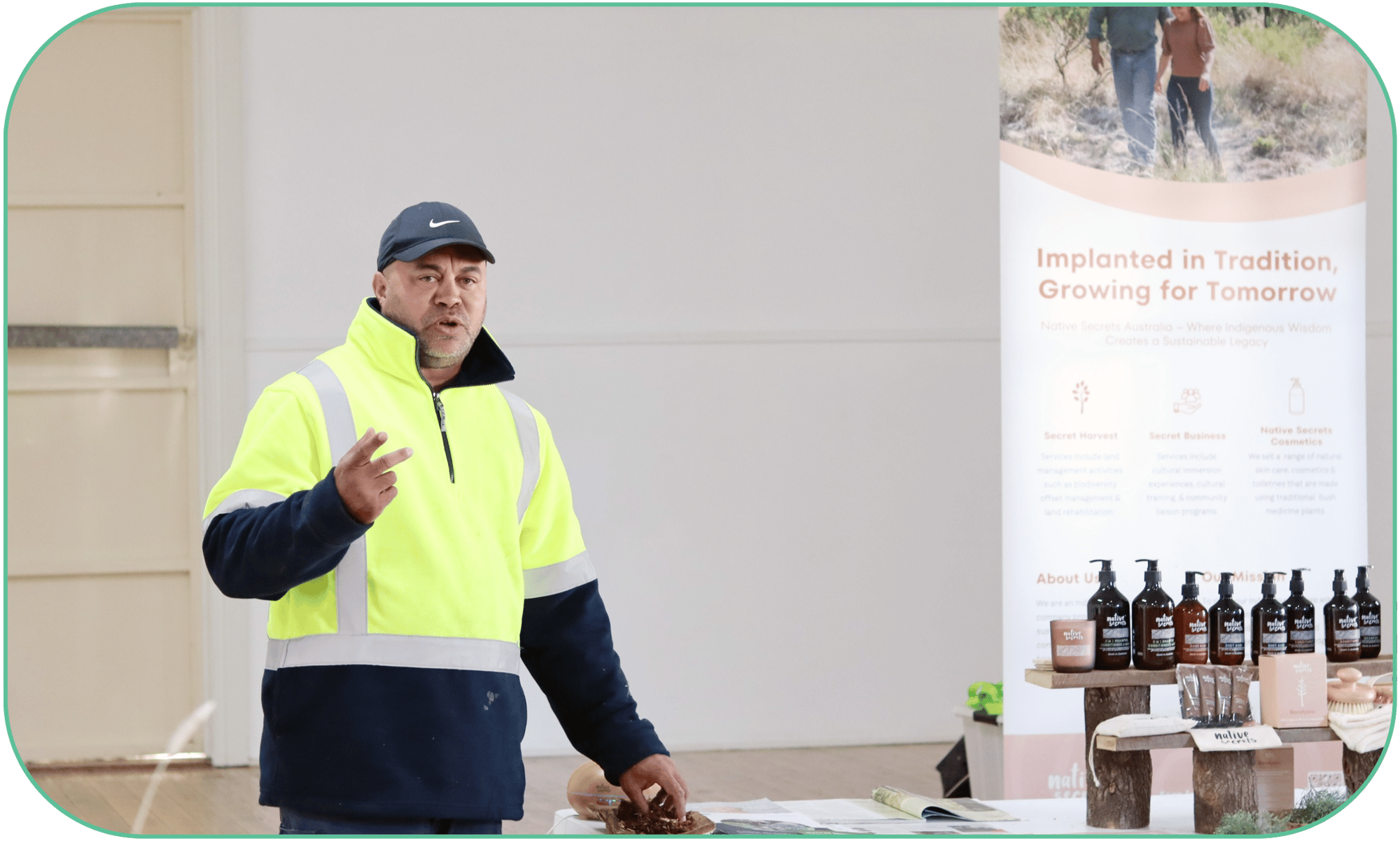
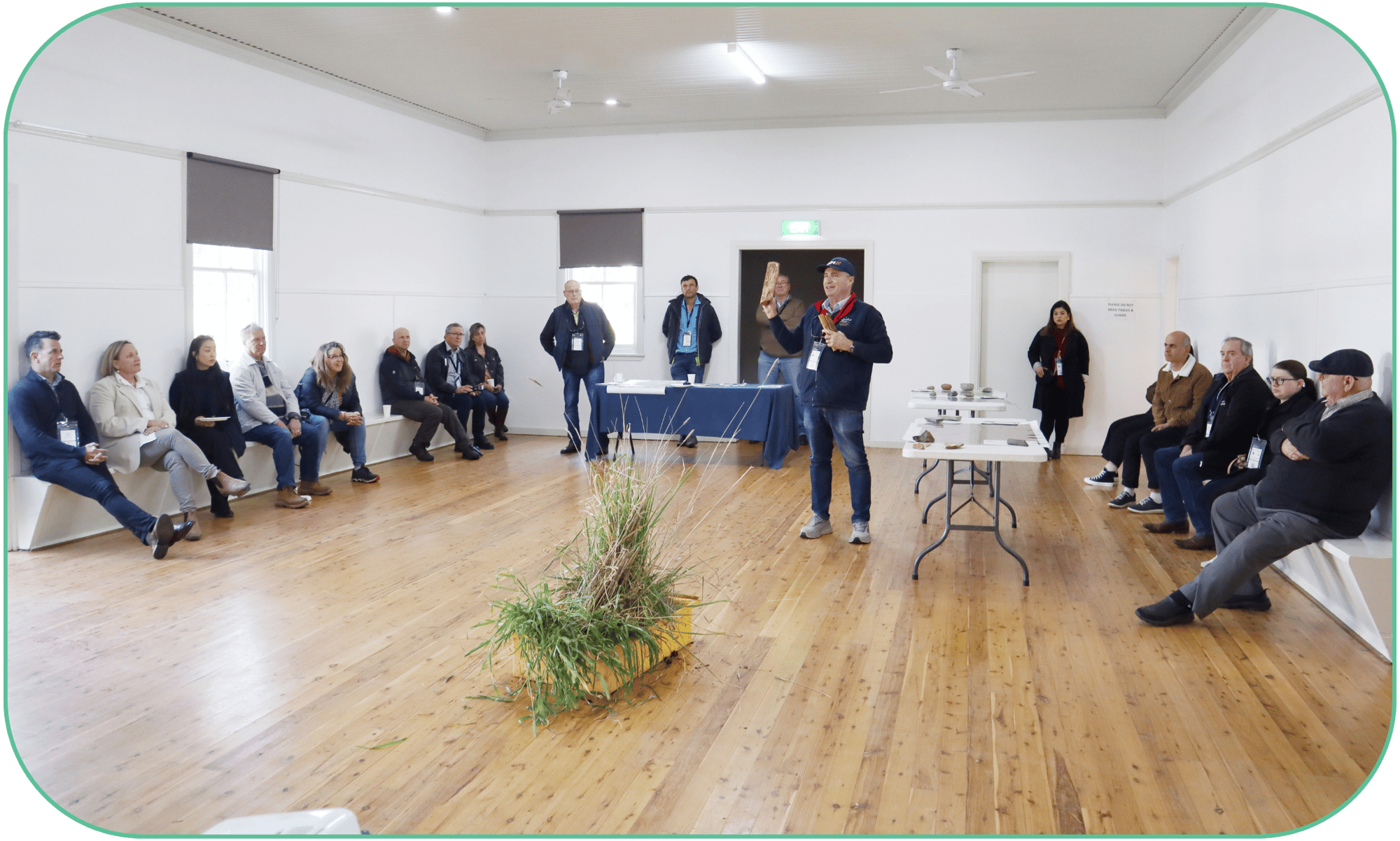
Site Tour
The final day of the forum involved an energy tour of the region, which began at Native Secrets, where business owners Phil Thompson explained how they manage a biodiversity offsets area for a local mining company and developed the concept of turning native plants and trees, like white cypress and buddha wood, that can become invasive if not managed properly, into essential oils, skin and hair care products, and candles.
The tour continued to Australian Strategic Materials (ASM) Dubbo Project, where ASM General Manager NSW, Mike Sutherland explained the project, which aims to mine rare earth and critical minerals and export them to Korea. The company has estimated the construction phase will cost $2.5 billion and employ 1,000 workers, with 270 full-time jobs expected when the mine is up and running.
Next stop on the tour was a visit to the Toongi Pastoral Company, where Fergus Job explained the history of the pastoral company, which has created a coexistence between natural resource management and mining resource management. Toongi Pastoral Company is owned by ASM and manages the agricultural land (1,995 ha) surrounding the Dubbo Project’s mining and processing areas (520 ha). Toongi Pastoral Company carefully integrates agricultural activities with management of the Dubbo Project’s biodiversity offsets.
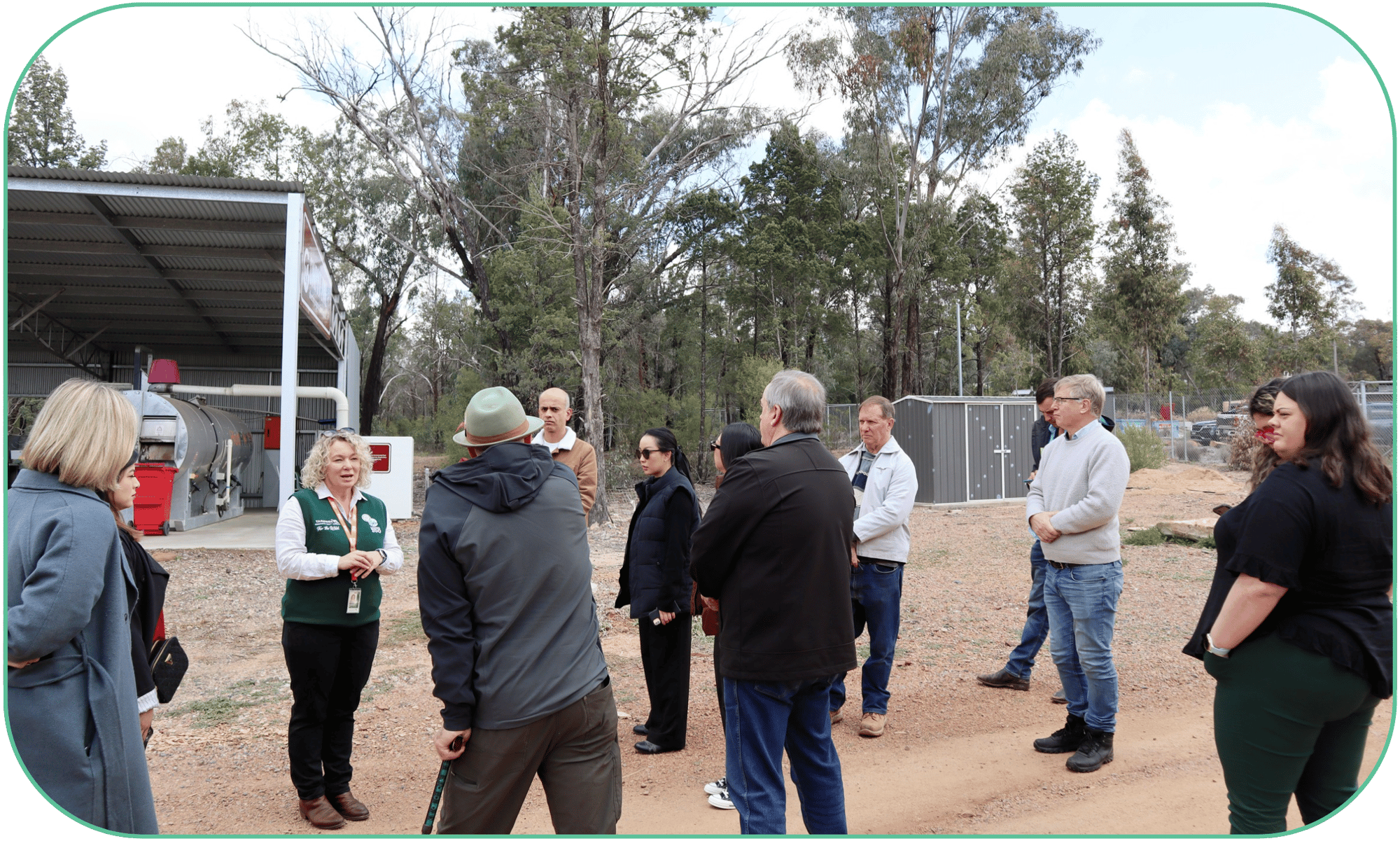

It means that every year from now on, approximately 7,000 tonnes of CO2 are no longer being released into the atmosphere. Taronga is procuring electricity from Red Energy – which is sourcing clean energy from a solar farm near Western Plains Zoo – in addition to the installation of 500kW of solar panels across both zoos.
BROUGHT TO YOU BY





